- Programme & Sessions
- Speakers
Xavier Gourlaouen
Group Manager & Aseptic Expert Liquid Packaging Product Technology & Development
Nestlé

Ensuring the seamless delivery of commercial sterile products to consumers, sourced from over 220 lines spanning across 30 nations, may not appear as complex as rocket science. With a well-established recipe and advancements in aseptic technologies over the past two decades, aseptic production has evolved into a standardised practice. Yet, the ongoing commitment of food producers like Nestle towards maintaining food safety and quality at a competitive cost persists. This challenge transcends mere adherence to aseptic principles and technological designs. Operational reliability is indispensable beyond the initial line commissioning, beyond routine day shifts, and even when operations deviate from the planned sequence.
In this presentation, Xavier shares Nestle’s comprehensive approach to anticipating and preventing any lapses in sterility. Firstly, cultivating enduring partnerships with suppliers to shape user-centric designs. Secondly, assuming technical leadership during the commissioning and qualification of new lines. Thirdly, mastering operational fundamentals with precision. Lastly, but indispensably, cultivating competencies and fostering the right mindset across all operational facets. Through this multi-faceted strategy, Nestle endeavors to fortify its commitment to delivering food safety and quality to consumers worldwide.
Born in France, Xavier holds a degree in Mechanical Engineering. His professional journey can be divided into two distinct phases, initially as a supplier followed by a transition to the food production sector. During his initial 15-year tenure at Serac, within the Aseptic Division, Xavier fulfilled various technical roles, exhibiting a keen focus on mechanical design. Since 2011, his career has been anchored at Nestle, exclusively within Research and Development, with a continued emphasis on aseptic filling technology. Commencing with a pivotal role at Nestle Marysville in the United States, serving as the Global R&D hub for Ready-to-Drink applications, Xavier played a vital role as an expert in the validation and implementation of preform sterilisation & filling equipment, alongside pre-radiated web bag-in-box aseptic technology in Asia.
Transitioning to Konolfingen, Switzerland in 2016, his responsibilities expanded significantly. Leading the R&D team, with a mandate extends globally across all aseptic technologies within Nestle's diverse business portfolio. Their focal points encompass devising future innovation strategies, nurturing operational competencies, strategic partner selection, technology enhancement and standardisation. Concurrently, Xavier has assumed a leadership role within Nestle's Global Expert Aseptic Network for the past three years, dedicated to fostering a culture of excellence within the organisation.
Wesley Pieterse
Global Manager, Industry Segment Poultry, Red Meat and Fish & Seafood
Habasit
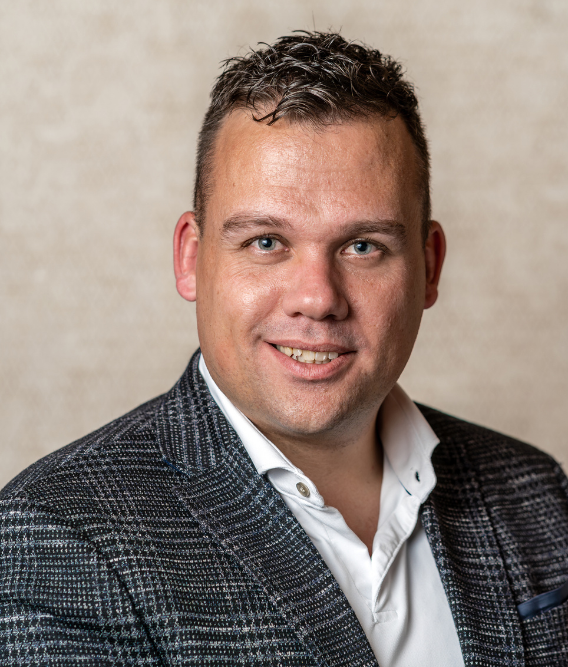
Achieving Hygienic excellence by design - A Habasit case
At the EHEDG World congress 2024 Enrico and Wesley will highlight the critical role of hygienic design to achieve the hygienic excellence.
Hygienic excellence within the food processing industry refers to the highest standard of cleanliness and sanitation, which is essential for maintaining the consumers health and preventing disease.
This concept is not only about being free of dirt and bacteria but, also includes the design of facilities, equipment, and components to ensure they can be easily, efficiently, and effectively cleaned.
Hygienic excellence is a comprehensive approach that combines proper design, maintenance, and cleaning protocols to achieve an environment that supports health and cleanliness at the highest level.
By means of a case study, the Habasit team will provide insights into various aspects of a successful, hygienic design driven, new product development of a critical industrial component.
The exercise will highlight how the hygienic design can contribute to increase food safety and sanitation protocols’ efficiency, by reducing resource utilization such as labor, water, detergents, and water sewage treatments.
The presentation will also show the validation methodologies that Habasit, in collaboration with Fraunhofer IVV put in place to measure the achieved hygienic performance.
Wesley Pieterse, with over 15 years of experience in international food processing, is the Global Manager Industry Segment Poultry, Red Meat and Fish & Seafood at Habasit. He has witnessed a wide range of food processing practices, both exemplary and concerning in terms of food safety.
Wesley works closely with businesses worldwide, collaborating with local teams to enhance food-processing processes through hygienic and innovative belting solutions. Recognizing the critical role of food safety in protecting consumer health and industry reputation, he focuses on addressing biofilm contamination on production equipment. This contamination can harbor harmful microorganisms and reduce shelf life.
As a leading conveyor and processing belt supplier, Habasit collaborates with protein processors and equipment manufacturers to improve food safety and efficiency. Additionally, the company is committed to reducing natural resource consumption and promoting sustainability in its operations.
Wesley and his team at Habasit have established a clear mission: to contribute to food safety, maximize yield optimization, and support the sustainability goals of food processors worldwide.
Uğur Uzuner
General Manager
SADEF Gıda Sanayi ve Ticaret A.Ş.
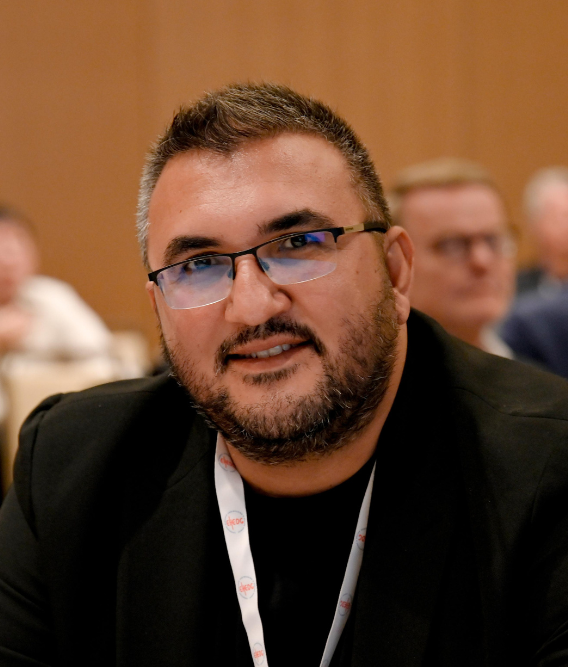
Turkiye joined EHEDG in 2012. Commencing in mid-2014, Hygienic Design Training and face-to-face hygienic design introduction visits began at the company level by Onur Devres. In 2015, the first three members joined EHEDG from Turkiye.
As stated under GFSI 2020 JI and JII topics, food processing facilities' construction and food processing equipment should be designed and engineered according to hygienic design principles. However, explaining all this to companies and ensuring they understand, accept, and internalize it (and become members and pay the EHEDG membership fees) takes time. Primarily since 2016, visits and briefings have been conducted every year for current, global, and potential members. Consequently, the number of members increased, and existing members continued to stay within EHEDG.
At the end of 2021, Sadef decided to establish a freeze-dryer facility in Aydin. For the design of the facility, Onur Devres and Ugur Uzuner, who had previously received hygienic design training from him, started discussions with architects, constructors, installation engineers, building element manufacturers, refrigeration companies, fruit processing machinery manufacturers, and freeze dryer equipment manufacturers. Positive discrimination was particularly applied to EHEDG members in the selection of subcontractor companies. After creating the preliminary construction project, work began on the placement of devices, installations, and drainage. To eliminate the problems encountered during this period and to ensure better project realization, non-member subcontractor companies were encouraged to join EHEDG and the architects, engineers, and designers from Sadef and subcontractor companies involved in the project attended the EHEDG Advanced Course on Hygienic Engineering and Design.
As of 2024, the construction of the 23,000 m2 Sadef company facility has been completed; the number of members has approached 40; and nearly 40 global member companies have participated in EHEDG activities in Turkiye.
The Sadef project has actually been an example of constantly addressing the importance of hygienic design and engineering in a country and observing its development over time on a unique company basis. We believe that this will set a new state in benchmarking for other companies.
Uğur Uzuner was born in 1988 in Giresun-Dereli. He obtained an Associate Degree in Food Technology from Süleyman Demirel University (2006-2008), and later completed his studies in the Food Engineering Department at the same university between 2009 and 2013.
He served as the R&D and Quality Control Manager at Saray Gıda San. ve Tic. A.Ş. (Bakery Products Producer) between 2008-2009, and as the Production Manager at ATA Holding- ATA Ekmek Unlu ve Gıda Mad. San. Tic. Ltd. Şti. (Bakery Products Producer) between 2013-2016. Between 2016-2017, he worked as the Assistant Factory Manager at HSG Tarım Ürünleri ve Gıda San. Tic. A.Ş., where he was involved in R&D activities and the establishment of new facilities.In 2017-2019, he served as the Factories Manager at Pol's Erm Tarım A.Ş., where he oversaw the green field establishment and commissioning of IQF frozen product lines, freeze-dryers, jam, tahini, molasses, and tahini halva production lines. During this time, he conducted R&D studies on freeze-drying processes to determine optimal parameters.
Since 2021, he has been serving as the General Manager of Sadef Gıda, where he has completed the green field establishment of a 23,000 m² facility, including the commissioning of IQF frozen product lines, freeze-dryers, and infused fruit production lines, as well as conducting R&D studies. He is married and has a daughter named Mila.
Timothy Rugh
Executive Director
3-A
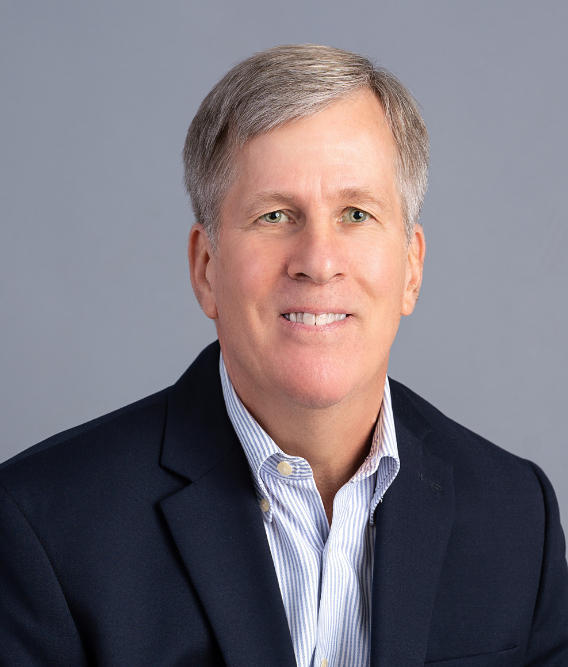
3-A SSI has a long and respected history of developing criteria for the design of equipment and systems used to produce, process and package milk and dairy products, other foods, and beverages. This presentation will explore the role of 3-A SSI today as a valued and trusted partner in helping to assure food safety through hygienic design. Specifically, this will describe the content and use of 3-A Sanitary Standards and 3-A Accepted Practices, the voluntary 3-A Symbol authorization and other certificate programs, 3-A SSI Knowledge Resources and the benefits of ongoing collaboration with EHEDG.
Timothy R. Rugh, CAE, has served as Executive Director of 3-A Sanitary Standards, Inc. since the group became organized as a new stand-alone entity in January 2003. 3-A SSI maintains more than 80 sanitary standards for equipment and accepted practices for processing systems used in the food and pharmaceutical industry. 3-A SSI also administers the 3-A Symbol authorization program to help regulatory sanitarians, fabricators, and processors assure that processing equipment conforms to the design criteria for acceptance by USDA, FDA and state regulatory authorities. 3-A SSI design criteria and marks are used by companies around the globe to enhance product safety for consumers of food, beverages, and pharmaceutical products.
Members of 3-A SSI include the Food Production Solutions Association, the International Association for Food Protection, and the International Dairy Foods Association.
Thierry Benezech
Research Director
INRAE

The presentation will explore current strategies for reducing the environmental impact of mandatory cleaning and disinfection operations in the food industry, which currently involve high consumption of drinking water, chemicals, and energy. Fouling of food processing surfaces and the necessary cleaning operations remain significant industrial challenges. These challenges typically result in economic penalties due to the fouling of heated surfaces and the substantial effort and cost required to ensure food quality and hygiene standards.
However, with dwindling water resources, increasing costs of water treatment and chemical disposal, and new regulations mandating reduced environmental impact, it is imperative to find sustainable solutions. The presentation will highlight research findings on the advantages of hygienic design, innovative cleaning systems such as foam cleaning, and the use of new bio-based chemicals. These elements will be discussed in the context of Life Cycle Assessment (LCA) analyses to demonstrate their effectiveness in mitigating environmental impacts.
Thierry Bénézech serves as the Research Director at INRAE, a prominent French national research institute focusing on agriculture, food and environmental sciences. Based at the University of Lille's UMET research unit, he specialises in hygienic engineering, exemplified by over 70 scientific publications and book chapters. His career spans extensive participation in European projects since 1995, contributing notably to frameworks like FP7, H2020, and others. Thierry led the FP7 SUSCLEAN project, emphasising hygienic design’s role in reducing chemical usage and water consumption, and played a pivotal role in the Interreg VEGiTEC project with the University of Ghent, pioneering foam flow cleaning for closed systems in the vegetable processing sector. His commitment to advancing hygienic standards extends to his involvement with the EHEDG foundation since the early 1990s, where he chaired the test method development working group for over a decade.
Recently, he contributed to international working groups drafting guidelines for the food and feed industries on cleaning and disinfection principles and CIP installations' hygienic design requirements. Currently, Thierry is engaged in the European Fairchain project, focusing on designing small-scale machinery for farmers using bio-based chemicals, further cementing his reputation as a leader in hygienic engineering and sustainable agricultural practices.
Talha Çelik
Member of the Board of Directors
SADEF Gıda Sanayi ve Ticaret A.Ş.
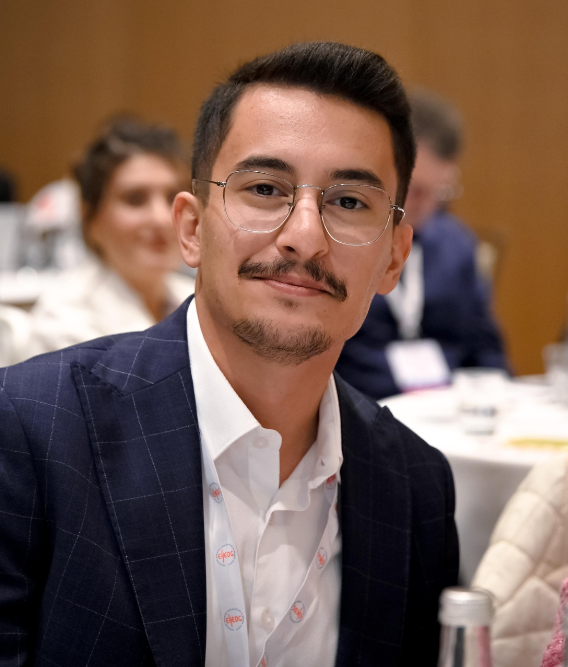
Turkiye joined EHEDG in 2012. Commencing in mid-2014, Hygienic Design Training and face-to-face hygienic design introduction visits began at the company level by Onur Devres. In 2015, the first three members joined EHEDG from Turkiye.
As stated under GFSI 2020 JI and JII topics, food processing facilities' construction and food processing equipment should be designed and engineered according to hygienic design principles. However, explaining all this to companies and ensuring they understand, accept, and internalize it (and become members and pay the EHEDG membership fees) takes time. Primarily since 2016, visits and briefings have been conducted every year for current, global, and potential members. Consequently, the number of members increased, and existing members continued to stay within EHEDG.
At the end of 2021, Sadef decided to establish a freeze-dryer facility in Aydin. For the design of the facility, Onur Devres and Ugur Uzuner, who had previously received hygienic design training from him, started discussions with architects, constructors, installation engineers, building element manufacturers, refrigeration companies, fruit processing machinery manufacturers, and freeze dryer equipment manufacturers. Positive discrimination was particularly applied to EHEDG members in the selection of subcontractor companies. After creating the preliminary construction project, work began on the placement of devices, installations, and drainage. To eliminate the problems encountered during this period and to ensure better project realization, non-member subcontractor companies were encouraged to join EHEDG and the architects, engineers, and designers from Sadef and subcontractor companies involved in the project attended the EHEDG Advanced Course on Hygienic Engineering and Design.
As of 2024, the construction of the 23,000 m2 Sadef company facility has been completed; the number of members has approached 40; and nearly 40 global member companies have participated in EHEDG activities in Turkiye.
The Sadef project has actually been an example of constantly addressing the importance of hygienic design and engineering in a country and observing its development over time on a unique company basis. We believe that this will set a new state in benchmarking for other companies.
Talha Çelik was born in Istanbul. Following the English Preparatory Program at Okan International University in Miami, USA, in 2016, he completed Okan University, Faculty of Business and Administrative Sciences, International Trade Department in 2021. Since 2019, he has worked in various positions at the family company END Aluminium. He is currently a board member of Sadef, a company that produces frozen, infused, freeze-dried fruits and functional foods. Representing the Celik Family at the Sadef company established in Aydın, he works in the construction and purchasing activities of the facility from the initial idea and design stage. He has successfully completed the EHEDG Advanced Course on Hygienic Design Training program.
Steve Arnold
Food Standards Manager EU & US
SMC
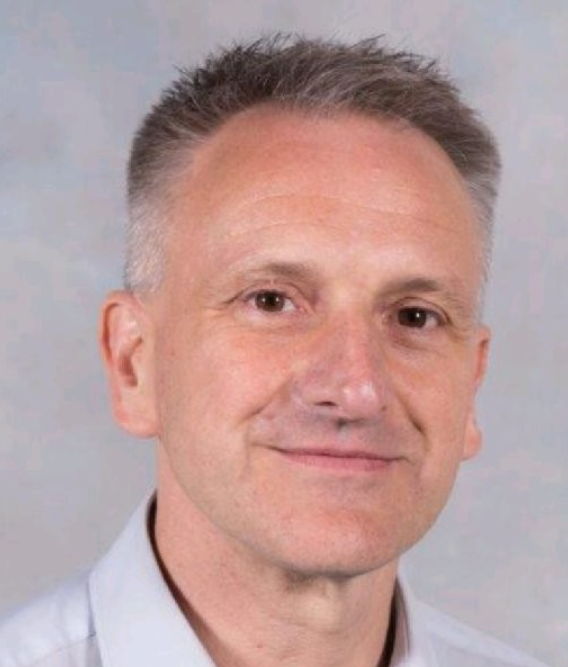
Compressed Air in a food factory is often considered as a part of utilities and its importance in food production is often overlooked. Electricity, steam, and water often attract all the attention and investment and the compressed air system is often neglected. Compressed air generated at the compressor house is often presumed to be clean and filtered to the required ISO level ready for use in the factory.
But what happens when that “clean filtered” compressed air leaves the compressor room to perform its job of work in the factory? What legacy debris, rust, oil, water vapour, particulates, bacteria are hiding in your compressed air network ready to be blown directly on to your food products, associated food contact surfaces and packaging? The risk of microbiological, physical, or chemical contamination is high.
Current guidance from the likes of BRCGS, IFS, FSSC 22000 and SQF is vague and with the release from the GFSI of Scopes J1 and J2 there is an increased focus on hygienic design and food safety.Now is the time to reassess your compressed air at point of use filtration in light of your HACCP and prerequisite requirements.
Steve is a pragmatic forward thinking food automation specialist working for SMC Corporation. Steve’s worked for SMC UK as their Food Project Sales Manager for ten years building great relationships with both global food manufactures and strategic Original Equipment Manufacturers. Working in close collaboration with these key stakeholders he’s delivered multiple continuous improvement, productivity, and sustainability projects all significantly contributing to the bottom line.
In August 2023 Steve took on a new challenge for SMC Corporation and now leads their Food Safety Program for Europe and North America. Steve is leading a program to educate and up skill SMC’s salesforce in all aspects of food safety and product design to ensure the solutions they propose meet current and future regulatory standards. He is a key resource within the business and supports both his colleagues and customers in Europe and North America on all aspect of Food Standards, Food Safety and Hygienic Design. Steve is currently the Treasurer of EHEDG UK and Ireland and is an active member of EHEDG Working Groups.
Dr. Ing. Stephan Kronholz
Vice President Hygienic Solutions
INTERROLL
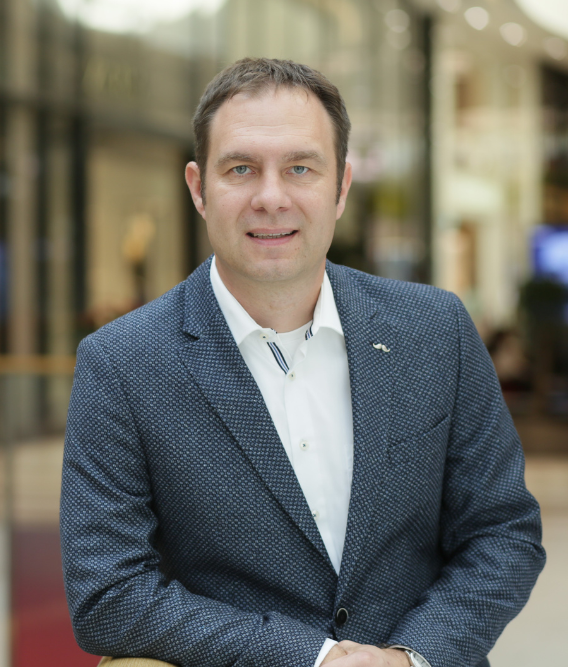
Based on our proven Drum Motor, which has been in use for years in thousands of food applications around the world, the SHC is the new solution for packed food applications. Engineered under European Hygienic Engineering and Design Group (EHEDG) guidelines, these conveyors ensure compliance with hygiene standards and withstand dedicated cleaning procedures. The innovation lies in the drive and control units, incorporating proven technology from Interroll’s leading position in the material-handling industry.
Waterproof rollers, as well as proven solutions such as the RollerDrive, MultiControl and Power Supply enable advanced 24/48V technology and facilitated automation in packed food applications. Energy-efficient stainless steel roller conveyors, driven by the 50-watt RollerDrive and zone-specific control units, offer over 50 percent energy savings compared to conventional systems. Additionally, the zero pressure accumulation reduces wear and tear on modular belts, eliminating the need for frequent belt changes and reducing microplastic generation. With waterproof rollers, the risk of cross-contamination due to leakages is mitigated. Encapsulation prevents the accumulation of water, dirt, and cleaning agents inside rollers, addressing customer concerns about product contamination. Experience the future of sustainable and efficient box transportation with Interroll's innovative solutions; let’s work together to develop a business case for your business.
Stephan holds a degree in Electrical Engineering from TU Ilmenau and a PhD in Microelectronics from Research Center Jülich. He introduced chemical vapor deposition of SiGe into semiconductor mass production and worked for seven years in the semiconductor industry with AMD and GlobalFoundries, contributing to a technology transfer to Samsung. He then joined a medium-sized special machinery company as Technology Scout and Head of Research, where he led a startup team for a new business unit on hydrogen pressure vessels, later sold to Cummins.
At Interroll, Stephan began as an innovation project manager, successfully launching two product platforms in May 2022. He then became Vice President of Hygienic Solutions, focusing on stainless steel conveyors with special hygienic requirements. Stephan holds over 150 patents and has several publications to his name, showcasing his expertise and contributions to microelectronics and semiconductor technology.
Samuel Peppin
Managing Director
Bioscan
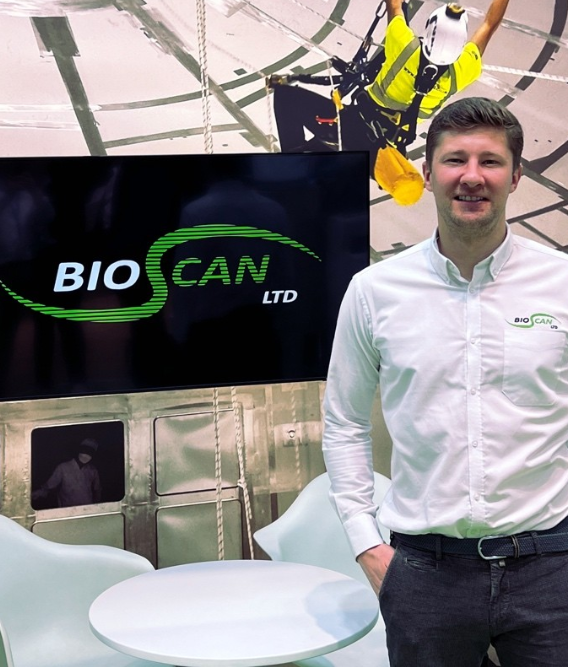
At the EHEDG World Congress 2024 Sam will highlight the critical role of crack detection inspections within the food industry's preventative maintenance programmes. Drawing from his experience in the food processing industry, he will provide insights into various aspects of crack detection – from types and root causes, to specific equipment involved (such as spray dryer systems, tanks and silos) and associated food safety risks.
Emphasising the importance of preventative maintenance, Sam will delve into the frequency of inspections necessary to mitigate risks effectively, exploring different methods and strategies.
As Managing Director of Bioscan LTD, Sam is dedicated to the global improvement of food safety and consumer health, through offering preventative maintenance products and services, using environmentally friendly and innovative technologies.
Sam has a 15-year experience in the food manufacturing sector, having started out as an apprentice for a leading European fruit juice producer as a manufacturing and maintenance technician. Upon completing his apprenticeship, he was given an opportunity to begin a journey of performing non-destructive integrity inspections on food processing equipment around the world.
Having gained a solid background in the inspection field, he decided to join forces with some ex-colleagues to set up Bioscan. Their goal is to further enhance and develop the testing technologies, ensuring that the end clients can access the most effective methods available in the market, while minimising downtime. The company specialises in spray dryer and tank/silo crack detection, as well as biofilm identification.
Russell Dunn
Former Vice President Global Quality and Customer Relations
Barry Callebaut

Having spent almost 30 years working in and assessing food manufacturing sites across the globe, Russell has seen some of the best and the worst that is out there. In this interview style session, Russell will be sharing his real life experiences of how equipment design, factory layout and poor practices lead to food safety challenges.
Russell started life as an analytical chemist working on the British Nuclear Energy programme, focused on reactor design materials. In 1995 he then transitioned to the food industry and has been working in the Food Safety and Quality arena since then. He initially worked in operational roles in the UK and then in 2000 progressed to Food Safety auditing for KJS (now Mondelez) covering the global footprint of manufacturing and supplier sites for 6 years.
He has since held various leadership roles within Mondelez and subsequently Barry Callebaut, focused on delivering Food Safety and Quality programmes. During this time he has been involved in various business mergers and greenfield projects, and has worked across multiple food categories. Russell is passionate about the value of training and culture in driving effective food safety programmes.
Robert Stelling
Director Professional Cleaning & Hygiene
RAI Amsterdam/ Interclean
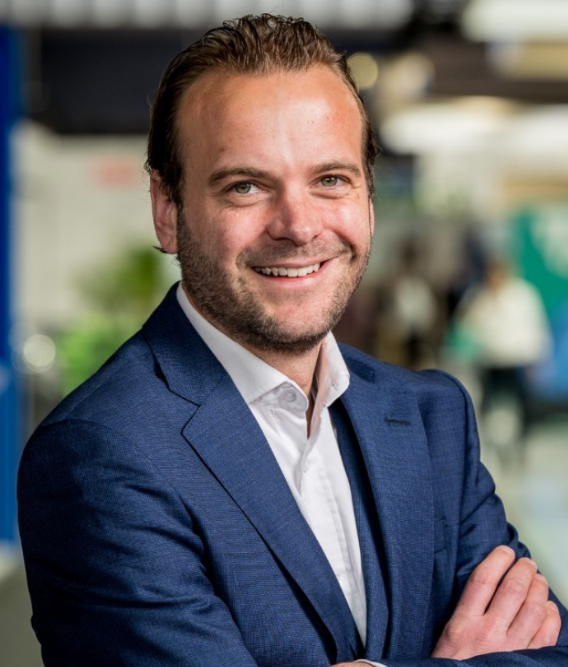
In this presentation, Robert will bridge best practices and global trends in the professional cleaning and hygiene industry with food safety and hygienic design. He will provide valuable insights into the critical areas of training and education, emphasising their role in fostering behavioural change and promoting sustainability. Robert will also offer a brief introduction to the professional cleaning and hygiene sector, highlighting its significance in maintaining high standards of cleanliness and safety. Attendees will gain a comprehensive understanding of how industry-leading practices can be applied to enhance food safety and hygienic design, driving improvements in both areas. This session is essential for professionals seeking to stay informed about the latest developments and innovations in cleaning and hygiene, and their impact on food safety.
Robert Stelling has been active in the professional cleaning and hygiene industry for over 12 years. In various roles at exhibition organiser RAI Amsterdam, he has organised conferences and trade shows for the industry across Europe, North America and Asia, including the renowned Interclean Amsterdam event. Throughout his career, Robert has developed a global network and established a reputation as a thought leader within the professional cleaning and hygiene sector. His extensive experience in event management and industry engagement has made him a pivotal figure in advancing industry standards and fostering international collaboration.
Quentin Guglielmini
General Manager
Liftvrac
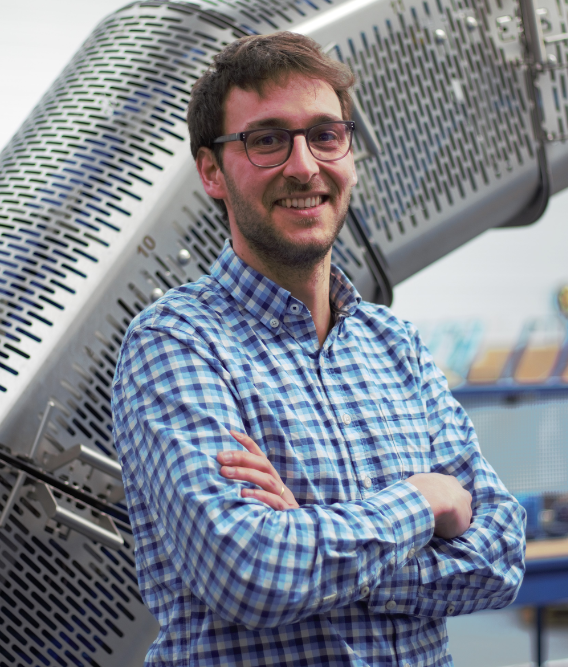
Hygienic design can be a lever for innovation and a business opportunity by meeting the current and future expectations of food processors, especially in certain markets such as the United States, and in sectors like meat and dairy. In response to these food safety-related challenges, new regulations and standards are emerging.
In preparation for these changes, Liftvrac’s R&D department has implemented a comprehensive routine that spans from monitoring to collaborative construction, encompassing training and methodology for all staff members engaged in hygienic design. In his presentation, Quentin will share a case study with major advancements in hygienic design pertaining to Liftvrac’s conveyor systems and their strategies for penetrating new, increasingly demanding markets. The company is committed to collaborating with all stakeholders involved in hygienic design to effectively address these challenges.
Quentin Guglielmini trained as an engineer at IPSA, specialising in aeronautical systems. Graduating in 2014, he developed his quality expertise in one of the most challenging sectors, aeronautics. Before taking up the position of Managing Director of Liftvrac, he was Operations Manager and then Operations Manager, accumulating experience in the production of food processing conveyors. He developed his knowledge of the agri-food industry through contact with teams, partners and customers.
Since 2017, Quentin has held a position of responsibility at Liftvrac and is committed to advancing hygienic design and its principles within the company. For him, hygienic design is everyone's business at Liftvrac. The EHEDG is a strategic partner in this process. Liftvrac actively participates in the EHEDG working group on belt conveyors.
Peter Merhof
Manager Welding Technology and Standards
GEA
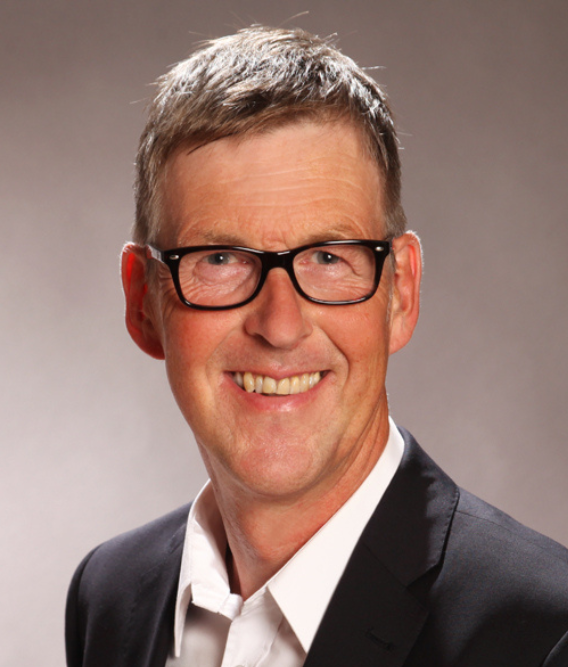
Peter's presentation, aims to provide an overview of the latest initiatives undertaken by the EHEDG Working Group ‘Welding’. The presentation will highlight the recent revision of EHEDG Guideline 35, detailing its main changes, and will discuss the upcoming revision of EHEDG Guideline 9, focusing on the incorporation of additional welding technologies used in hygienic applications. Attendees will gain valuable insights into the evolving standards and practices in hygienic welding, emphasising the group's commitment to advancing welding technologies to meet stringent hygiene requirements. This session is essential for professionals seeking to stay abreast of the latest developments and innovations in the field of hygienic welding.
Peter Merhof is a seasoned expert in welding technology with a robust educational background in mechanical engineering from the University of Hannover. He is an International Welding Engineer, European Welding Inspection Engineer, and a certified NDT-Inspector (VT2). With over three decades of experience, Peter has honed his skills in welding pharmaceutical and hygienic components through various sophisticated processes, including TIG, TIG-Orbital, Friction Welding, EB-Welding, and Laser-Welding.
For the past 20 years, Peter has served as a certified welding supervisor for GEA Tuchenhagen GmbH. Since 2020, he has expanded his role to include global responsibilities as the worldwide manager for welding technology and standards at GEA. His leadership and expertise have been instrumental in maintaining high standards and innovation in welding practices. Peter has been an active member of the EHEDG Working Group ‘Welding’ since 2005 and has chaired the team since 2013. His commitment to advancing welding technology and standards in the industry is reflected in his long-standing contributions and leadership within this prestigious group.
Patrick Wouters
Global Hygienic Design Leader & EHEDG Vice President
Cargill
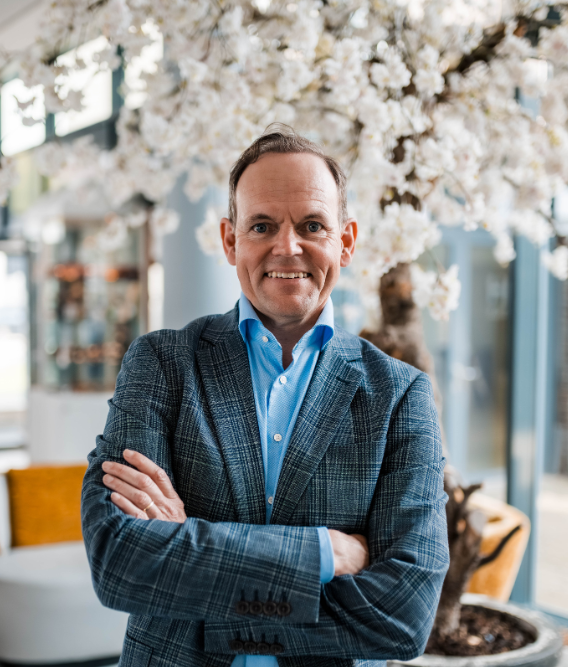
Join me at the upcoming EHEDG World Congress during my break-out session on the way to advance food safety and quality through Hygienic Design Risk Management (HDRM). During this session I will present a comprehensive new EHEDG guideline on assessing and managing hygiene risks in the design and operation of food-related buildings and equipment. Aimed at both suppliers and users within the food supply chain, the HDRM framework integrates hygiene risk assessment with risk reduction strategies, covering design, construction, integration, and operational procedures. Aligned with industry standards like EN1672-2 and ISO 14159, this new EHEDG guideline 58 offers a step-by-step approach supported by practical checklists and examples. Attendees will gain valuable insights into establishing hygiene risk criteria, identifying and analysing risks, and implementing effective control measures. My session offers strong insights for professionals dedicated to enhancing food safety, sustainability, and productivity in food manufacturing.
Patrick C. Wouters, PhD. is the Global Hygienic Design Lead at Cargill. He has 34 years of experience in Food and Beverage Production, R&D, Hygienic Design & Engineering and Quality Management.
Before joining Cargill 10 years ago Patrick worked at Unilever and in the dairy industry in The Netherlands (AMC & Melkunie). He is the Vice-President of the European Hygienic Engineering & Design Group (EHEDG), authorized hygienic design trainer and is the project lead of Hygienic Design Benchmarking project publishing various guideline/whitepapers and driving the importance of hygienic design in food safety management systems
Patrick holds a PhD degree on food preservation technologies from the Technical University of Berlin, Germany. Prior to his professional career he was in the Dutch Army.
Onur Devres
Food Safety & Quality Consultant - Partner
Devres Technology and Consulting Ltd.
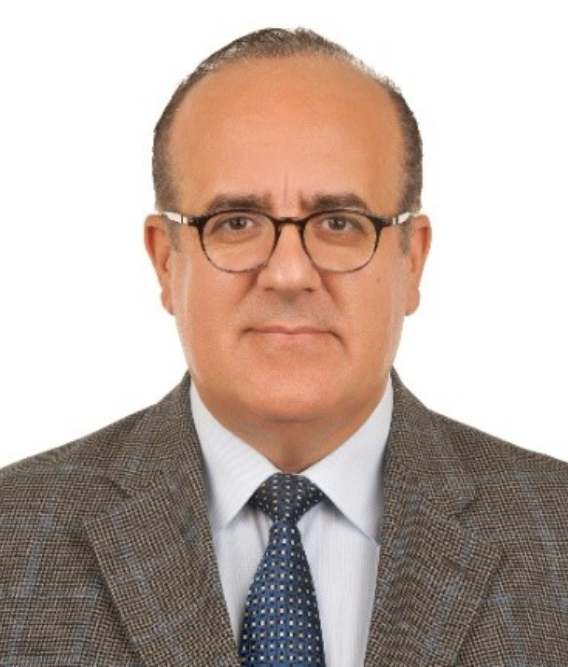
Turkiye joined EHEDG in 2012. Commencing in mid-2014, Hygienic Design Training and face-to-face hygienic design introduction visits began at the company level by Onur Devres. In 2015, the first three members joined EHEDG from Turkiye.
As stated under GFSI 2020 JI and JII topics, food processing facilities' construction and food processing equipment should be designed and engineered according to hygienic design principles. However, explaining all this to companies and ensuring they understand, accept, and internalize it (and become members and pay the EHEDG membership fees) takes time. Primarily since 2016, visits and briefings have been conducted every year for current, global, and potential members. Consequently, the number of members increased, and existing members continued to stay within EHEDG.
At the end of 2021, Sadef decided to establish a freeze-dryer facility in Aydin. For the design of the facility, Onur Devres and Ugur Uzuner, who had previously received hygienic design training from him, started discussions with architects, constructors, installation engineers, building element manufacturers, refrigeration companies, fruit processing machinery manufacturers, and freeze dryer equipment manufacturers. Positive discrimination was particularly applied to EHEDG members in the selection of subcontractor companies. After creating the preliminary construction project, work began on the placement of devices, installations, and drainage. To eliminate the problems encountered during this period and to ensure better project realization, non-member subcontractor companies were encouraged to join EHEDG and the architects, engineers, and designers from Sadef and subcontractor companies involved in the project attended the EHEDG Advanced Course on Hygienic Engineering and Design.
As of 2024, the construction of the 23,000 m2 Sadef company facility has been completed; the number of members has approached 40; and nearly 40 global member companies have participated in EHEDG activities in Turkiye.
The Sadef project has actually been an example of constantly addressing the importance of hygienic design and engineering in a country and observing its development over time on a unique company basis. We believe that this will set a new state in benchmarking for other companies.
Onur Devres graduated from the Mechanical Engineering Department at Dokuz Eylül University in 1983. He completed his master's degree in the same department in June 1985, focusing on the mathematical modelling of passive solar energy systems. In December 1985, he started working at the Scientific and Technical Research Council of Turkiye (TUBITAK), Marmara Research Centre in the Refrigeration Technologies Department. Since this department collaborated with the Food Technologies Department, he became indirectly involved in food processing within ongoing R&D projects. This led to a Mechanical-Food Engineering orientation in his career.
In April 1990, he earned his doctoral degree from Yıldız University, Department of Mechanical Engineering, with a study on the mathematical modelling of thawing processes for frozen meats. In October 1992, he was granted the title of Associate Professor (Docent) in Thermodynamics by the Turkish Council of Higher Education. Until he left TUBITAK, he worked on various food processing and storage projects.
He joined Istanbul Technical University, Department of Food Engineering, in March 1994. He was appointed Professor in the Department of Food Engineering and Food Technology on October 8, 1998. He left ITU in July 2011 to establish Devres Technology and Consulting Ltd. and has since been providing services as an engineer, consultant, EHEDG Authorised Trainer, and business developer in Turkey and abroad. His main activities focus on new technologies, new food processing facilities, and the application of hygienic design principles in food processing plants.
Nicolas Rossi
Project Manager and Researcher - Hygiene and Health Safety Department
Institut de l'Elevage (IDELE)
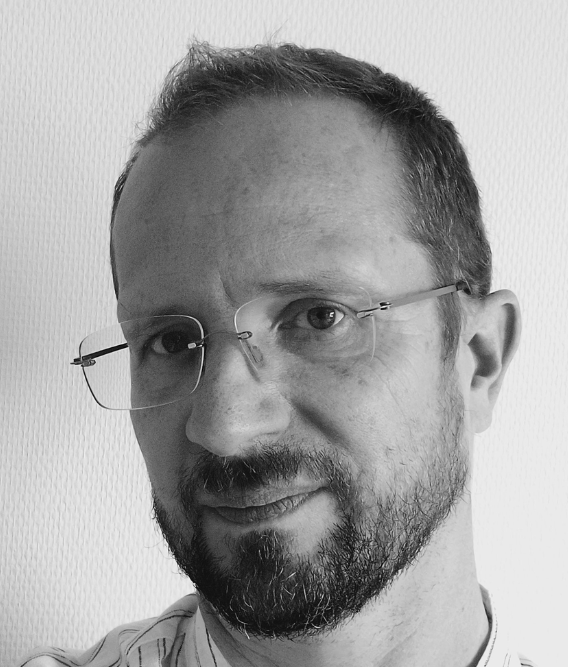
Soil adhesion to food processing environment surfaces, including floors, is unwanted as it may result in increased cleaning costs and act as a reservoir for undesirable pathogenic microorganisms. In France, a list of agreed floors for use in food production facilities is edited based on their slipperiness and their cleanability. This parameter is currently assessed by microscopic observation and enumeration of the surface imperfections (holes, cracks and aggregates)(Carpentier, B. 2011). This method is highly dependent on the evaluator experience and lacks of reproducibility. Therefore, a new standard method would be appreciated. The protocol described in the recently published EHEDG Doc.57 for the assessment of open process equipment cleanability was then tested and optimized for use on floors. This approach was also compared to a more conventional microbiological method. All three tested protocols allowed to differentiate floors samples as a function of their cleanability but results were inconsistent for a majority of samples as a function of the implemented test. This highlights the need for further research on floors hygiene in order to develop a new reliable standard method to assess the cleanability assessment test dedicated to floors.
Nicolas brings over 20 years of expertise to his role as Project Manager and Researcher at IDELE, a prominent French technical institute. His primary focus lies in hygiene and innovative technologies within the food industry. Nicolas holds an engineering degree in Food Science and Technology, complemented by a PhD in Chemical Engineering, underscoring his deep technical knowledge and academic prowess.
His career spans extensive consultancy for food industries, specialising in hygienic design and innovative technologies, particularly within the meat industry. Nicolas is distinguished as an EHEDG Authorised Evaluation Officer (AEO) and Authorised Trainer (AT). He plays a pivotal role as the head of the accredited test institute at ACTALIA, ensuring compliance with rigorous industry standards.
Within EHEDG, Nicolas is actively engaged in the Working Group ‘Test Methods’ and in ‘Training & Education’. Furthermore, he co-chairs the Working Group ‘Meat Processing’, demonstrating his leadership and commitment to shaping best practices in food safety and technology. Nicolas's multifaceted roles underscore his dedication to advancing hygiene standards and fostering innovation in food processing technologies.
Dr. Niamh Burke
Dairy Processing Technical Lead
Dairy Processing Technology Centre

Sustainability has become a focal point within the food industry, with the dairy sector experiencing increasing pressure to reduce its environmental impact and adopt more sustainable practices. This imperative is compounded by the need to maintain product quality, to meet consumer demands and adhere to regulatory standards. A pivotal aspect in this journey is the optimisation of cleaning-in-place (CIP) cycles, which requires constant monitoring and involvement by all supply chain stakeholders.
At the EHEDG World Congress 2024 Niamh will be presenting on the Effects of Process and Environmental Influences on Product and Process Optimisation, with a strong focus on cleaning-in-place (CIP) programmes for the dairy sector. Join me as we explore the challenges and opportunities in navigating the dynamic landscape of sustainable dairy operations.
Dr Niamh Burke has over ten years’ experience working in an industry academic research collaborative capacity, combining industry expertise with scientific awareness to deliver actionable research outputs. Niamh is a Dairy Processing Technical Lead with the Dairy Processing Technology Centre (DPTC), University of Limerick, Ireland. DPTC is a world-class collaborative Research and Technology Centre, key enablers of innovation, addressing common sectoral challenges, driving value creation, competitiveness and sustainability in the dairy processing sector. Niamh holds a BSc in Food Science and Health and a PhD in Dairy Processing. She has formed well-developed relationships with Irish dairy industry members and is an active member of the National Standards Authority of Ireland (NSAI), ISO Working Group for Milk and Milk Products, Food Safety Authority of Ireland (FSAI) and EHEDG.
Niamh’s areas of expertise include investigating the influence of raw milk quality on finished product quality through process capabilities and quality systems. Assessing the effects of microbial and chemical parameters on processing capabilities and finished product. Assessing hygienic design of dairy processes and environmental influences on product and process optimisation. Sustainable dairy processing for the reduction of carbon and energy.
Mieke Heymans
Niche Manager Specialised Nutrition
J-Tec Material Handling
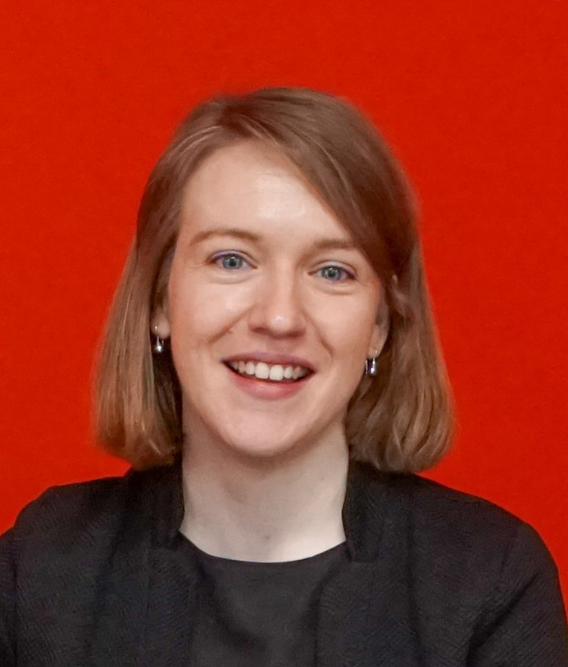
Incorporating hygienic design principles in a production facility reduces cleaning times and operational costs. This approach involves optimizing cleaning time through lean concepts and hygienic component design, minimizing cleaning frequency by optimizing product planning, and streamlining the overall cleaning process. While some design decisions may require a higher initial investment, they enhance cleaning efficiency over time. Utilizing materials that resist buildup and are easy to clean reduces maintenance time and resources. Additionally, analyzing changeover times during the design phase impacts operational expenses. Improved cleaning efficiency increases production cycles, thereby boosting productivity and profitability. Shorter cleaning times also reduce labor costs and water and energy consumption, contributing to sustainability and cost savings. Prioritizing cleaning efficiency ensures sustained high production performance.
Mieke Heymans works for J-Tec Material Handling, a part of the KatoenNatie Group. As a dedicated niche manager within Specialised Nutrition, she focuses on providing technical solutions for companies in the food industry. Additionally, she serves as a business development manager, seeking new and improved technologies to share and implement with her clients.
With over a decade of experience as project manager, Mieke has expertly overseen the implementation of food-safe production facilities, from engineering to validation. Currently, she continues to leverage her extensive expertise to supply both single process lines as well as complete turnkey installations with focus on ensuring the highest standards in food safety and quality. Mieke is passionate about striving for a food-safe industry by focusing on hygienic design, cleanability and quality.
Dipl. Ing. Martin Barnickel
Lecturer in Dairy Sciences
LVFZ Kempten

Without validated cleanability, you will never be able to sterilise a plant or reliably place your products on the market. A whole plant is more than the sum of its single parts. Even if you use certified components for construction a lot of hygienic critical effects are likely to occur. Hygienic testing of plants is mandatory before use and – much more critical – after years of production. During operation biofilm colonies were unintentionally promoted which resist the established cleaning and sterilisation procedures. Every food plant has got its own bacteriological biosphere. Therefore, adapted methods for cleaning/sterilisation validation need to be installed.
Finding microbiologic problems is possible with a manageable amount of technical and organisational efforts. These methods are in use for the validation of aseptic filling machines. For other sections of a plant these methods need to be modified. The results are clear and reliable for detecting recontaminations down to 10-9 cfu/ml. For the location of problems plants need to be checked in separate sections. It makes sense to validate non-aseptic plants to qualify improvements or changes in construction. The detection of non-bacteriological soil is difficult and not reliable because it is unlikely to flush out CIP-unremovable soil. Accessibility is seldom given for direct surface testing methods (EPS-coloration). Therefore, tailored differential methods should be used to choose the one which leads to the most striking results. In several bachelor professional studies, the effectivity of some testing methods where quantified on pilot plants. You need to determine the best option for your plant through trial and error.
Martin Barnickel is an accomplished professional with a background in agricultural sciences, specialising in dairy technology and processing, from the Technical University Munich in Weihenstephan. Since 1991, he has been a valuable member of the Lehr-, Versuchs- und Fachzentrum für Molkereiwirtschaft (Training, Test, and Competence Center for Dairy Systems) in Kempten, Germany. In his role as a trainer and teacher, Martin imparts his extensive knowledge to dairy managers and technicians, shaping the future of the industry. Additionally, he applies his expertise in developing and designing test equipment, as well as serving as a chief project manager for plant engineering and design initiatives.
Martin is an EHEDG Authorised Trainer and member of the EHEDG Sub-Committee Training & Education.
John Holah
Director, Scientific Committee, Pioneering Food Safety Association
Kersia
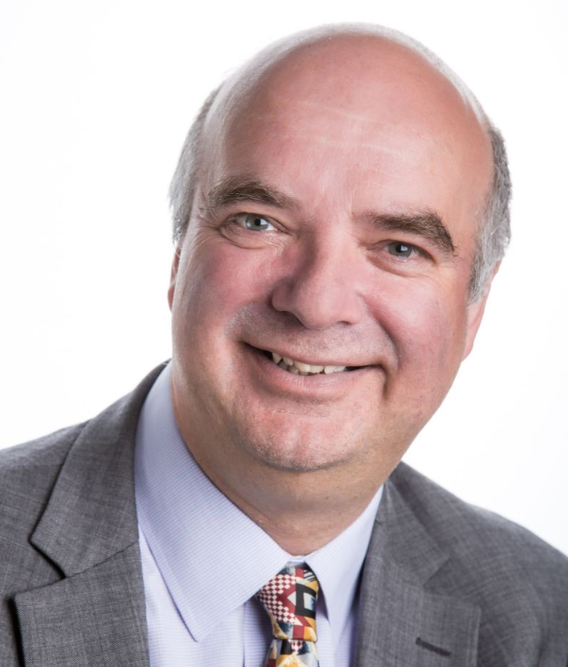
To date, food plants have been designed primarily for food safety, with hygiene zones to control microbial hazards and segregation to separate allergens. Following the 9/11 terrorist incident, there has also been a US led requirement to design food plants to resist bioterrorism. The need for this design approach to control known and perceived hazards was further enforced with the publication of the GFSI 2020 benchmark scopes, JI and JII.
As a key driver for future plant design, food safety has been joined by customer choice, climate change, power demand and, following the COVID-19 pandemic, food operative respiratory protection. Customer choice will favour vegan, vegetarian and religious based foods, which will lead to an exploration of the concept of ‘what is free-from’ in terms of the segregation of specific ingredients e.g., meat or a particular meat species. Climate change will require protection from weather events e.g., flooding, high winds, high snowfall, drought, but also a proliferation in pest and pathogen varieties and numbers. Big data, AI, automation, electric vehicles etc. will all lead to enhanced power demands and may require on-site solar panelling or wind farms. With pandemics estimated to be now every 4 years, together with the need to keep food factories in production, factory design will need to focus on operative separation, directional air flows and humidity/temperature control.
Following retirement from Kersia in December 2022, John established Pendennis Food Hygiene Ltd. and provides consultancy on food safety incident management, environmental pathogen management systems, hygienic design and general food hygiene. John remains active with Kersia as the Director of their Pioneering Safe Food Scientific Committee. From January 2021, John became Principal Corporate Scientist for the Kersia Group, having been Technical Director at Holchem Laboratories Ltd since 2014. Prior to this John was Head of Food Hygiene at Campden BRI, for over 20 years. John is also an Honorary Professor in Food Safety and Hygienic Design at Cardiff Metropolitan University.
John’s work has covered the design of the food manufacturing infrastructure (buildings, equipment) and processes (personal hygiene, cleaning and disinfection, maintenance), resulting in guidance on many of the hygiene practices used today. Internationally recognised in the troubleshooting and management of Salmonella and Listeria, John continues to add to the scientific literature and is the editor of a trilogy of food hygiene books. He has supported the IAFP, EHEDG, SOFHT and GFSI for many years, has chaired various ISO, CEN, GFSI and EHEDG committees on hygienic design and chemical disinfection and has sat or sits on, UK government committees on food safety and hospital acquired infections.
Johan Roels
Sales Manager Food
J-Tec
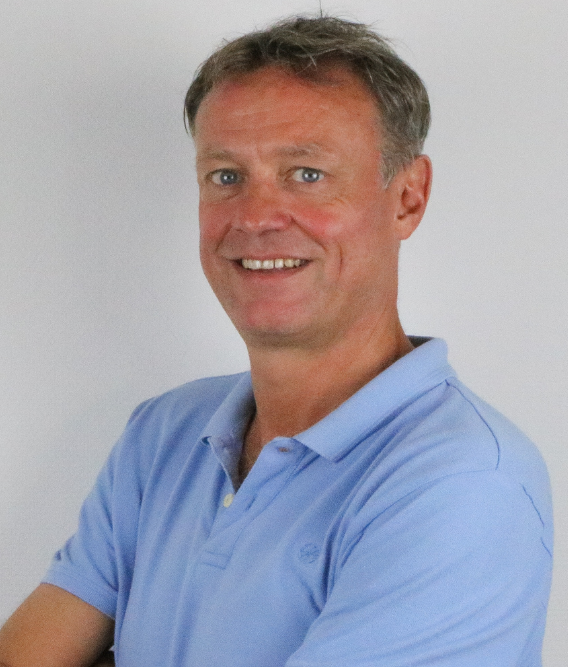
Joachim Wunderlich
Head of Department - Retention of Food Quality
Fraunhofer IVV

The decontamination of surfaces using UV-based methods is an important and widespread option, particularly in the food industry. Microbiological validation with suitable test microorganisms are required to quantify the disinfection efficiency of such methods. The widely used mould strains Aspergillus brasiliensis and Aspergillus niger were classified as “S2” germs in Germany some time ago. As a result, these strains may only be used in authorised laboratories and are not allowed to be used at the site of machine manufacturers or in food facilities. It is to be expected that they may also be categorised “S2” in other countries. Furthermore, the recommendations of the VDMA (Machinery and Equipment Manufacturers Association) regarding the validation of UV-based sterilisation processes are used throughout Europe. The Aspergillus strains were also named as test germs in these recommendations.
The identification of suitable surrogates for Aspergillus species was the aim of a research project at the Fraunhofer Institute IVV (Freising, Germany). Two suitable replacement strains for efficacy tests of xenon flash light and UV medium and low pressure lamps were tested in extensive studies and recommended for practical use. These strains have now also been included in the VDMA recommendations and replace Aspergillus niger resp. Aspergillus brasiliensis.
Joachim Wunderlich studied Microbiology and Biotechnology at the Julius Maximilian University in Würzburg and graduated with a degree in Biology. Since 1990, he has occupied diverse roles at the Fraunhofer Institute for Process Engineering and Packaging in Freising, near Munich. Since 2009, he has been the Head of the Food Quality Retention department.
From 2016 to 2019, he served as the Operational Manager of the Klevertec Competence Center in Kempten, which he established in collaboration with Kempten University of Applied Sciences. His expertise encompasses various domains, including the development of surface sterilisation methods such as gas plasma and UV, conducting hygiene evaluations and assessments of production facilities, and the development and evaluation of food preservation techniques. He specialises in microbiological investigations of food and packaging materials, with a particular focus on the development of microbial validation methods.
With over three decades of experience, Joachim has been deeply involved in the microbiological validation of filling and process machines. Notably, his expertise is integrated into the VDMA recommendations for the validation of filling machines.
Jeroen van den Boezem
Market Director
NIRAS Nederland

Ensuring hygienic design in food and beverage plants is of prime importance for both product safety and regulatory compliance. However, the industry often zooms in on isolated details of equipment, overlooking key elements of conceptual process design, project preparation, commissioning and validation. At the EHEDG World Congress 2024 Jeroen would like to offer a holistic perspective on hygienic plant design, showcasing a typical engineering project as an illustrative example, with a focus on technical engineering solutions aligned with hygiene standards. Navigating through each phase and level of detail (LOD), he will highlight challenges, tools and the crucial relationship with commissioning and validation, unveiling success factors for scale-ups, greenfield and brownfield projects. Recognising the consequences of inadequate project preparation, this presentation will emphasise how a coordinated engineering approach is a fundamental investment to mitigate project risks, ensure quality and fulfill production requirements.
As the Market Director of NIRAS in the Netherlands, Jeroen van den Boezem serves as a representative of the NIRAS Group, a leading international consultancy and engineering agency. With a Master of Science degree in Organic Chemistry and over two decades of experience in the process industry, he possesses a solid foundation for his professional activities.
Within his role, Jeroen undertakes a multifaceted array of responsibilities. He serves as a trusted advisor to manufacturers and takes pride in his client relationships, adeptly navigating complex industry dynamics. Moreover, he acts as an intermediary, facilitating collaboration among experts with diverse backgrounds both within and beyond NIRAS. Additionally, Jeroen assumes the role of a strategic business developer, actively exploring emerging markets and new or improved technologies to drive continuous growth and development.
Jeroen is deeply committed to advancing sustainability initiatives and reducing our impact on this world. Furthermore he embraces food innovation trends and possibilities all whilst promoting project excellence within the food and beverage industry. His keen interest in these areas underscores his dedication to driving positive change, better results and challenging the status quo.
James Hartley
Global Sanitation Director
Mondelēz
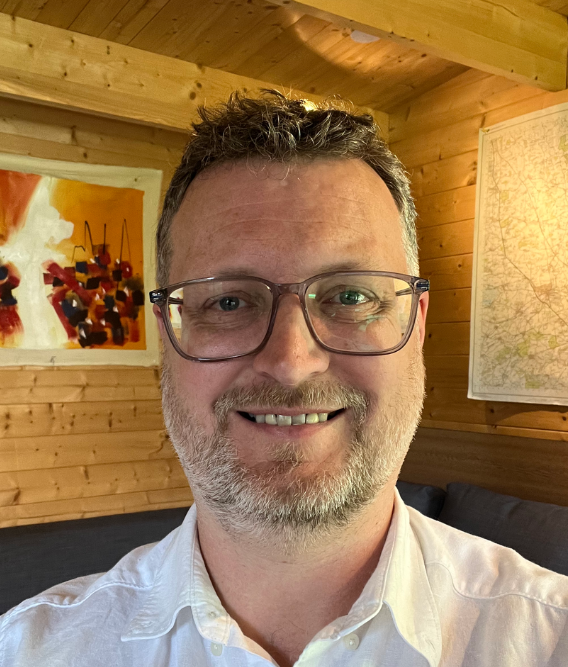
Food industry has been significantly advancing the last decades in terms of monitoring and surveillance as well food safety standards and regulations. Food security, reduction of waste and carbon food print has been significantly targeted as areas that need improvement. This puts a lot of pressure to business owners ensuring that investment perform to their financial expectations while at the same time they remain compliant to their applied regulations. To this we already know that even a perfect food safety plan and Environmental Monitoring programs although they may ensure consumer safety they pose a significant operation cost due to poor Hygienic Engineering Design standards.
A key success factor to mitigate this is by streamlining the communication and delivery of knowledge and information needed between business owners in the supply chain of infrastructure and asset development lifecycle., is key to ensure equipment and facility development are build fit for purpose.
Is this presentation we will be able to have a short look into the actual figures and practical quantifiable examples of how engineering specifications affect performance of operations.
The optimal selection of equipment needs to balance many factors, such as quality, performance, safety, cleanability, cost and sustainability.
In this presentation, Jim and Dimitri will share approaches taken by one of the largest food manufacturing companies in the world. This will cover topics such as processes, technical requirements, competencies and capabilities of those involved, as well as some of the challenges of managing this in a global manufacturing company. It will also cover how EHEDG guidelines are applied and the importance of collaboration between Original Equipment Manufacturers and end users in understanding and implementing user requirements.
Jim currently leads the Global Sanitation organisation within Mondelēz International. This group is responsible for defining the overall global strategy, and for designing, implementing and improving standards for Hygienic Design, Sanitation, Pest Control and Good Manufacturing Practices across 135 manufacturing facilities in 45 countries. Jim joined Mondelēz International in 2018, with previous roles as European Quality & Product Safety Director for Sensient Flavors and over 15 years in quality, EHS and technical management for Nestlé. In 2020, Jim was elected as an Advisory Board member of the European Hygienic Engineering & Design Group (EHEDG), representing the food manufacturing industry.
Jim holds a BSc and PhD in Chemistry from the University of Birmingham (UK), advanced qualifications in auditing, food hygiene and HACCP, and has authored and contributed to several industry publications relating to sanitation and hygienic design.
Irene Llorca
Hygienic Design and Food Safety Project Manager
AINIA
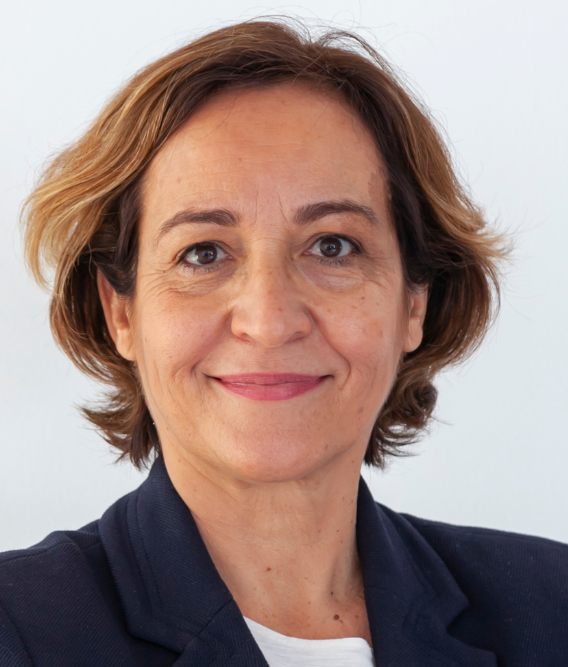
EHEDG has developed and published a new test method for assessing the cleanability of food processing equipment intended to be used in open processing and wet spray cleaned without dismantling. This test will now reinforce the Certification Scheme and provide a practical approach for certifying equipment used in open processing applications. The test follows the basic principles of EHEDG Guideline 2 method and consists of soiling the piece of equipment to be tested, followed by a mild cleaning procedure and a final assessment. A reference piece is used to monitor correct implementation of the cleaning procedure to differentiate between good and poor design features.
The reproducibility and repeatability of the test is achieved using an industrial robot to conduct the cleaning procedure in a controlled way using sophisticated 2D mapping software. The degree of cleanliness is based on the removal of a soil containing a UV tracer and is assessed by evaluating the residual soil using a UV light. The test is intended as a basic screening test for identifying areas of poor hygienic design in equipment used in open processes and is not indicative of performance in industrial cleaning situations. You can download (or purchase) EHEDG Guideline 57, ‘A Method for the Assessment of Open Process Equipment Cleanability’ here.
Agronomic Engineer (food industries specialization), she has been working as a project manager at AINIA for more than 25 years, focusing on food safety, hygiene in the food industry and the hygienic design of equipment and facilities. Provides technical assistance to companies in the development, implementation, and auditing food safety management systems as well as in hygienic design of equipment and facilities and provides consultancy on food safety incidents, troubleshooting and risk assessment. She is involved in R&D projects mainly on Hygienic Design and new C&D technologies.
Irene is responsible for the accredited test laboratory at AINIA for performing the cleanability test (Doc 2). She is also responsible for performing the new EHEDG cleanability test for open process equipment according to EHEDG Doc57.
She is one of the 12 Authorised Evaluation Officers to evaluate the hygienic design of the equipment and to prepare the certification files for the use of the EHEDG certification logo. She is an EHEDG Authorised Trainer.
She is responsible for the Spanish Regional Section of EHEDG, and she is an active member of the EHEDG subgroups “Training & Education” and “Certification”.
Igor Berezhnoi
Quality and Food Safety
Lactalis
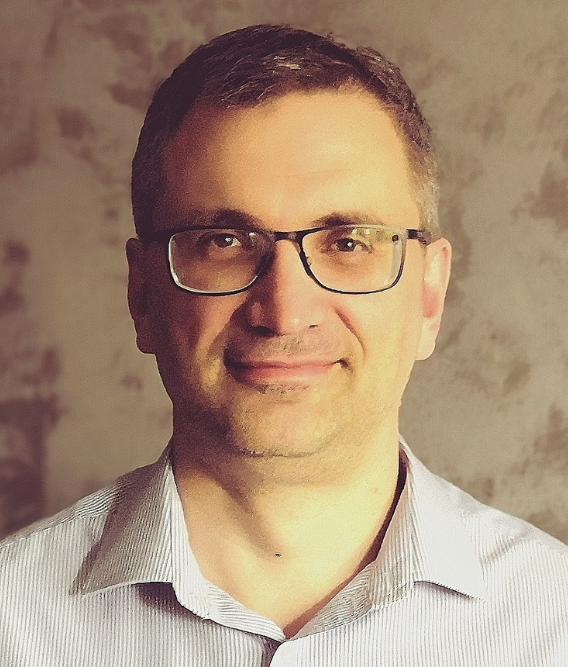
This presentation draws from the extensive expertise of Subramani Asaithambi, Lactalis India Quality Director and a respected member of EHEDG. It explores the critical hazards associated with the heat treatment stage in food processing, particularly focusing on the potential survival of virulent pathogens originating from raw materials. While heat treatment is essential for ensuring food safety, many real-life quality and safety incidents stem not from the process itself but from inadequately designed or improperly operated heat treatment equipment.
At Lactalis, emphasis is placed on seven key hygienic design principles to mitigate these risks:
-
No mixing of untreated product with heat-treated
-
Safe separation of product from CIP
-
Cleanability
-
Holding section design
-
Self draining
-
Compatibility of materials
-
Smooth surfaces and accessibility
In particular, cleanability is a critical factor in ensuring food safety. Key principles include:
-
7T + 4S principles
-
No dead ends
-
Hygienic dampeners
-
Vortex breakers
-
No shadow areas
-
Correct agitator design
Igor Berezhnoi, born in 1974 in the USSR, brings over two decades of expertise in food science and quality management across multinational corporations. With a PhD in Physics and additional education in Management, including mini-MBAs from INSEAD and VLERICK, Igor has continually advanced his skills, most recently completing a HACCP course at Campden BRI in 2023.
His career spans prominent roles at Nestlé, Danone, and Lactalis, focusing on R&D and Quality in sectors such as dairy, chocolate, ice-cream, and dehydrated culinary products. Certified as an FSSC 22000 auditor since 2006, Igor has excelled as a lab assistant, R&D project manager, Sensory Analyst, and Quality manager across multiple plants.
Currently, as an auditor-consultant, Igor collaborates closely with industrial, engineering, and R&D teams at Lactalis, driving global standards in quality and food safety. His expertise encompasses managing heat treatment, hygienic design, allergen and fermentation management, and spearheading initiatives in standardisation, innovation, digitalisation, and performance enhancement. Igor is a published author in prestigious industry journals and is multilingual, fluent in Russian and English with proficiency in French and ongoing learning in Spanish. His dedication to advancing food safety and quality standards globally underscores his commitment to excellence in the food processing industry.
Hein Timmerman
EHEDG President/ Global Sector Specialist Food & Beverage
EHEDG/ Diversey a Solenis company
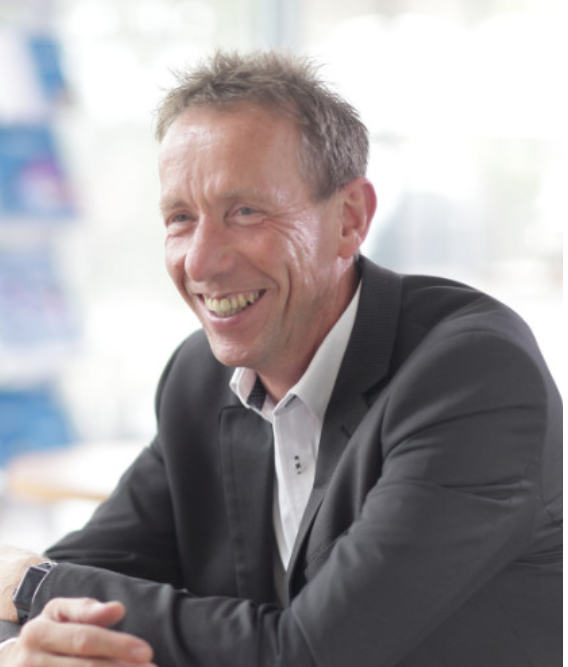
Hein Timmerman is a dedicated Food Technologist with extensive international experience across various industries. His career has equipped him with expertise in Engineering, Sales Management, Business Development and Technical Management, particularly in Dairy and Processed Food Technology, Automated Cleaning Systems and CIP techniques. He has been serving as the Global Sector Specialist for Dairy & Processed Foods at Diversey since 2011. In this role, he leverages his background in food technology and hygienic design to drive innovation and excellence in cleaning and sanitation solutions tailored for the dairy and processed foods industries.
His passion for hygienic design, sparked during his early days at Alfa Laval, has remained a constant throughout his career. Early on, Hein engaged with EHEDG, which he became deeply involved with. He is currently the Chair of the EHEDG Working Group ‘Cleaning In Place’, of the EHEDG Regional Section Belgium and, since January 2023, he is the EHEDG President.
Harm van den Oever
Branch Manager Eindhoven/ Manager
Volantis
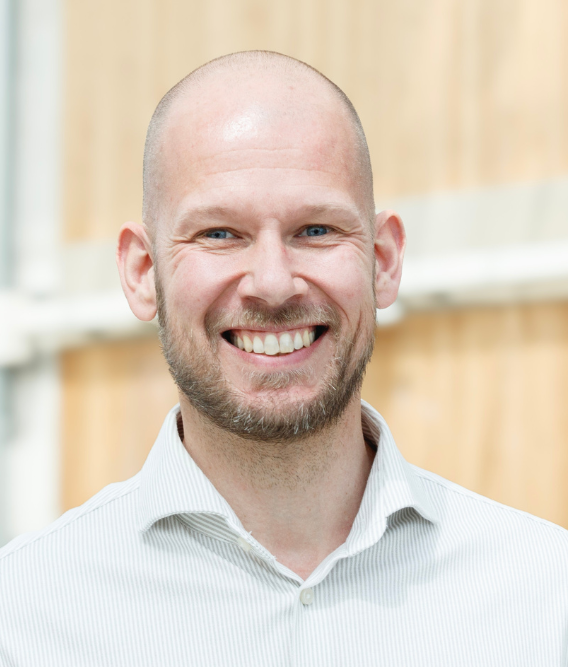
As the industry continues to innovate, the focus on hygienic food production is expected to remain a top priority for stakeholders across the food supply chain, especially in food processing facilities that handle products such as ready-to-eat meals, fresh produce, seafood, dairy products and baked goods. These items are susceptible to contamination and require extra precautions to maintain their safety and quality.
High care rooms, also known as high-risk or high-care areas, are specialised environments within food production facilities dedicated to handling and processing these sensitive or high-risk food products. These areas are designed to minimise the risk of contamination and ensure the safety and quality of the finished food product. They are comparable in many ways to cleanrooms, as known from the pharmaceutical and electronic industries. With a long history of cleanroom standards and guidelines, there is much we can learn from these industries related to the design, construction and start-up of these controlled environments.
The recent ISO 14644-4:2022 document, ‘Cleanrooms and Associated Controlled Environments Part 4: Design, Construction, and Start-Up’, is an internationally recognised standard that provides guidelines and requirements for the design, construction and start-up of cleanrooms and associated controlled environments. This presentation will explain the systematic approach to creating an environment that suits the needs of the product.
Harm van den Oever is a seasoned Engineering Manager from the Netherlands, specialising in building services and installations. With over 12 years of experience in the design and construction of Controlled Environments across the High-tech, Pharma, Biotech and Food sectors, he possesses comprehensive knowledge in contamination control and hygienic design.
Holding a background in mechanical engineering complemented by a master's degree in business, Harm adopts an interdisciplinary approach that covers technical, managerial and strategic facets of projects. He thrives on the challenge of balancing technical solutions with project constraints, alongside broader business and environmental goals.
Beyond project engineering and management, Harm is actively engaged in research focused on ventilation effectiveness and energy conservation within Controlled Environments. His work not only pushes the envelope in industry standards but also contributes to sustainable practices.
Harald Schuten
Senior Process Developer
FrieslandCampina

Ensuring food safety and meeting microbial specifications are critical goals in dairy production. At FrieslandCampina, we focus on designing production processes that bridge the gap between raw milk and the final product. This involves not only achieving microbial safety but also maintaining essential product attributes such as taste, structure, and nutrient integrity.
Traditional heating technologies, such as pasteurization and UHT, are widely used in the dairy industry to ensure microbial safety and extend shelf life. These methods rely on established standards for hygienic design and operation, ensuring effective microbial inactivation without recontamination.
However, emerging preservation technologies offer new opportunities for microbial reduction in liquid streams. These technologies, which include high-pressure processing (HPP), pulsed electric fields (PEF), ceramic micro filtration (CMF), and UV-C treatment, operate on different inactivation principles compared to heat. As a result, they present unique challenges and opportunities for hygienic design.
This presentation will explore the hygienic design principles that have been successfully applied to pasteurization and UHT processes and extend these principles to emerging technologies. We will discuss how to adapt hygienic design strategies to ensure sufficient microbial reduction while maintaining product quality in these new preservation methods. This includes considerations for equipment design, operational parameters, and validation procedures to prevent recontamination and ensure consistent product safety.
Join us to gain insights into the future of dairy preservation and how innovative technologies can be integrated into your processes while maintaining the highest standards of food safety and quality.
Harald holds a Master of Science degree in Food Technology from the Wageningen University, the Netherlands.
Food preservation technology has been his core topic within his career He started after his master at Wageningen Food and biobased Research where Harald held the position of scientist novel preservation technology, becoming a specialist in alternatives for heat preservation. This was followed by a role as senior food process developer at TOP-BV the Netherlands where he implemented alterative preservation technologies at SME’s.
Harald’s current role is senior scientist preservation technology at FrieslandCampina. This role covers the whole domain between raw materials and final products to ensure microbial food safety and specifications in relation to the product quality requirements for all the different product categories within FrieslandCampina. Within his current role, Harald is part of the EHEDG thermal treatment working group .
Giampaolo Betta
Hygienic Design Expert, Consultant, Trainer and EHEDG Evaluation Officer
SIIIA
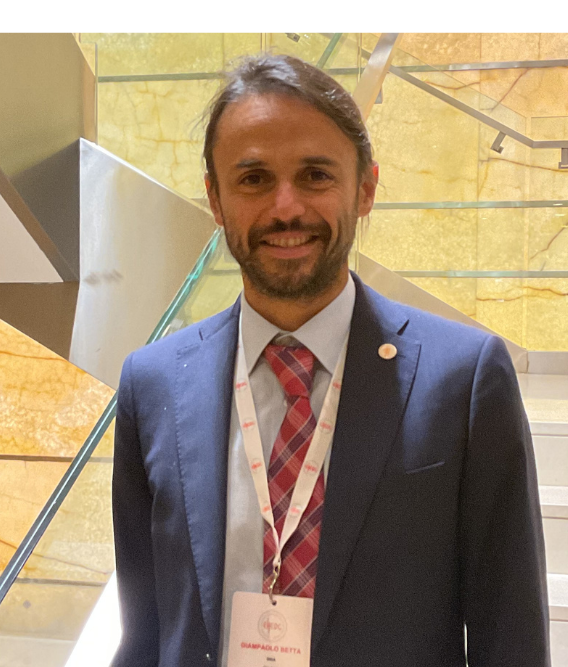
Open equipment is widely used in the food industry and is involved in the manufacture of various types of products, including perishable food products with significant risks of microbiological contamination. Fresh cut, ready meals and other ready-to-eat refrigerated products, which are gaining more and more in popularity among consumers, are, for example, mostly manufactured in open production lines.
The new EHEDG Doc.13 focuses on design criteria for equipment used in wet-cleaned, open food-processing areas and details and illustrates how the hygienic design criteria presented in EHEDG Document 8 can be applied to open equipment.
Giampaolo Betta is a Mechanical Engineer with a PhD in Food Science and Technology.
After having worked for several years in the university with research and teaching responsibilities, in 2016 he has founded SIIIA, Società Italiana per l’Innovazione nell’Industria Alimentare, which offers innovative services to the food industry and its suppliers, focusing on hygienic processing and hygienic design. In 2019, under his direction, SIIIA became the first Italian laboratory accredited according to the standards ISO 17025 for performing the EHEDG Doc.2 cleanability test.
Within EHEDG, he is Authorised Trainer, Authorised Evaluation Officer, Chaiman of EHEDG Italy and Chairman of the Working Group Open Equipment.
François Bourdichon
Food Safety Microbiologist & Consultant
Food Safety - Microbiology - Hygiene

The processing environment monitoring aims to ensure food handlers operate in a hygienic and safe environment, focusing on zoning, training, cleaning efficacy and eliminating harborages. Sampling plans should balance routine and investigative samples, identifying ‘gatekeeper’ points to prevent contamination and ‘investigation’ points to locate potential harborages. Corrective actions, including thorough cleaning and root cause analysis, follow positive results. Vector samples aid in identifying contamination sources, while strain typing helps determine necessary corrective actions.
The dairy sector emphasises monitoring to evaluate zoning, hygiene practices and sanitation efficacy, crucial for preventing recontamination events. Following a publication on processing environment monitoring, under the umbrella of ILSI Europe with ICMSF Members, François is working together with the International Dairy Federation (IDF) on developing similar guidelines for the dairy industry.
François holds a Master of Science in General Microbiology from Pasteur Institute, Paris and a Ph.D. from Università Cattolica Del Sacro Cuore, Piacenza, Italy.
After 15 years working for major dairy (Nestlé, Danone, Savencia) and confectionary (Barry Callebaut) food business companies, since 2017 he has been working as Principal Consultant for Food Safety Microbiology Hygiene, and since 2022 as Scientific Collaborator at DiSTAS, Università Cattolica Del Sacro Cuore, Piacenza, Italy.
François has represented France at the International Dairy Federation (IDF) since 2010, contributing expertise to committees like SCHMM, SCAMDM, and SCMH, where he's chaired since 2018, demonstrating his leadership in enhancing microbiological hygiene standards. He also engages in ISO TC34 SC9 and SC5 working groups and Codex Alimentarius Committees, shaping international dairy regulations. François's decade-long commitment to the IDF underscores his dedication to advancing dairy industry interests globally, ensuring quality, safety and hygiene standards align with best practices.
Felix Schottroff
Tenure Track Professor of Food Process Engineering
BOKU University
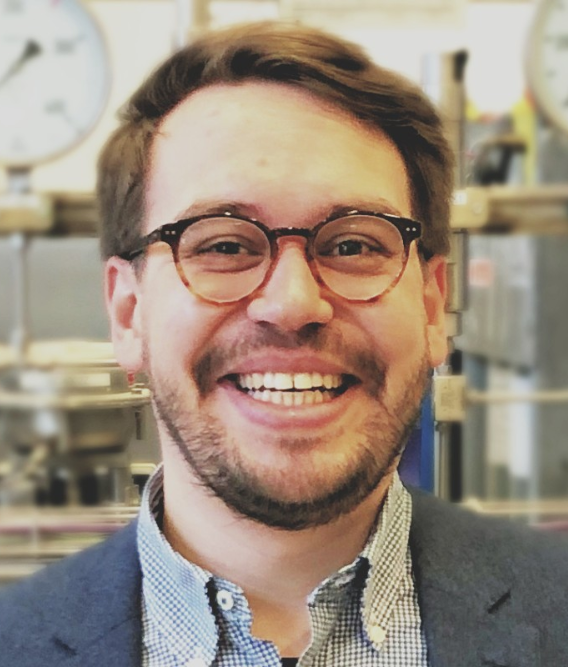
In November 2023, Young EFFoST (European Federation of Food Science and Technology) in cooperation with EHEDG kick-started the EYE Mentorship Programme during the EFFoST Conference in Valencia. This programme pairs young professionals with experts from the fields of food science and technology. In the programme, mentees and mentors meet regularly and work together on several topics according to their needs and preferences. In this, the focus lies on personal development as well as professional growth. Intertwined with the 1:1 meetings, on-site events are taking place to enhance networking and to provide hands-on workshops for all participants. In this talk, Felix Schottroff and Adwy van den Berg will present the highlights of the first round of the EYE Mentorship Programme and will announce the start of the 2nd round of the programme.
Felix Schottroff is a Tenure Track Professor of Food Process Engineering at BOKU University in Vienna, Austria, Institute of Food Technology. Felix received his PhD in January 2020, with his thesis on “Tailoring electrotechnologies for microbial inactivation in food and bioprocess engineering – Inactivation mechanisms, processing concepts, and equipment design”. In his current research, Felix focusses on various novel and non-thermal technologies for microbial inactivation as well as microbial food resources and sustainable and hygienic engineering, taking into account mechanistic approaches, product quality, energy efficiency, process and equipment design. Felix has scientific and practical experience from a variety of industry as well as research projects and has a strong passion for topics at the interface of microbiology and process engineering. Moreover, Felix acts as the co-chair of EHEDG Regional Section Austria and is member of the EHEDG Working Group on Sustainability.
Ester Fernandez
Processed Food Application Specialist
Diversey

The topic Ester is excited to share revolves around the everyday cleaning routines in food manufacturing, especially in Processed Food sites where Open Plant Cleaning (OPC) takes the spotlight. Traditionally, this process has required significant manual labor. However, Diversey has been developing new tools to address the daily challenges faced by the industry, including time constraints, productivity concerns and the imperative for sustainability.
At the EHEDG World Congress 2024, Ester will introduce a fresh survey for OPC, along with an innovative product that opens the doors to optimised pre-rinses, and a tool that provides continuous data control throughout the whole open plant cleaning process.
Ester Fernàndez is a seasoned professional in the food hygiene sector with a distinguished tenure at Diversey. Commencing in 2005 as a Processed Food Sector Specialist in Spain and Portugal before transitioning to a European role in 2009, assuming responsibility for fostering technical relationships with key food processors. Throughout her tenure, Ester has played a pivotal role in conducting and developing audits, spearheading comprehensive training initiatives, and cultivating a unified approach to food hygiene across diverse markets.
With a solid academic foundation, Ester holds a Chemical degree from the University of Girona, Spain. Her commitment to professional development is evident through her active participation in internal and external training programs and events. As a speaker, she leverages her extensive experience in the Food Sector to impart valuable insights, showcasing innovative projects and advancements, particularly in Open Plant Cleaning technology—a cornerstone application within the Processed Food Sector.
Ester's multifaceted experience and dedication to championing new technology and approaches make her an invaluable asset to both Diversey and the wider food industry.
Enrico Visconti
Head of Product Management
Habasit
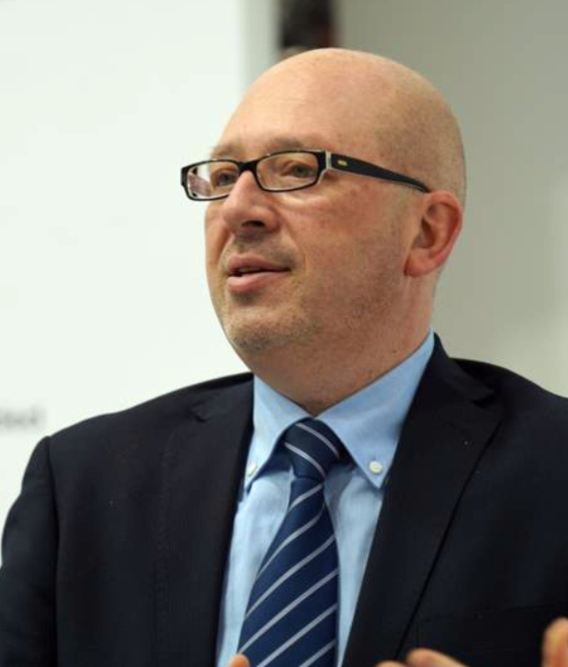
Achieving Hygienic excellence by design - A Habasit case
At the EHEDG World congress 2024 Enrico and Wesley will highlight the critical role of hygienic design to achieve the hygienic excellence.
Hygienic excellence within the food processing industry refers to the highest standard of cleanliness and sanitation, which is essential for maintaining the consumers health and preventing disease.
This concept is not only about being free of dirt and bacteria but, also includes the design of facilities, equipment, and components to ensure they can be easily, efficiently, and effectively cleaned.
Hygienic excellence is a comprehensive approach that combines proper design, maintenance, and cleaning protocols to achieve an environment that supports health and cleanliness at the highest level.
By means of a case study, the Habasit team will provide insights into various aspects of a successful, hygienic design driven, new product development of a critical industrial component.
The exercise will highlight how the hygienic design can contribute to increase food safety and sanitation protocols’ efficiency, by reducing resource utilization such as labor, water, detergents, and water sewage treatments.
The presentation will also show the validation methodologies that Habasit, in collaboration with Fraunhofer IVV put in place to measure the achieved hygienic performance.
As Head of Product Management at Habasit, Enrico is dedicated to understanding customers and prospects’ needs and pains and, translating them into new product solutions.
Enrico has over 30 years of experience in process and conveyor belting, with a global exposure and a long history of product development, engineering, and management.
Having gained a solid background in industrial applications, he focused on the food processing industry innovation. More specifically at food safety and sustainable resource savings, with the scope to achieve the hygienic excellence by design. He holds several industrial patents as inventor.
As an active member of EHEDG, Enrico is part of the “conveyor systems” working group.
Dyanne Parnel
Hygienic Design Consultant, Director, Sanitation and Quality Design
Standard Practices, LLC/Darigold

This presentation aims to give participants a comprehensive understanding of how hygienic design affects the entire organisation and demonstrate how involving all departments can reduce overall project costs. Participants will learn about the importance of involving all subject matter experts (SMEs) in the hygienic design process from inception to start-up. These SMEs include quality, food safety, sanitation, operations, regulatory compliance, human safety, and engineering.
Key points to cover:
1. Holistic Impact of Hygienic Design:
-
Understanding how hygienic design influences every aspect of the organization.
-
Recognizing the potential cost savings achieved through effective design and departmental collaboration.
2. SMEs in Hygienic Design:
The critical role of SMEs from various departments:
-
Quality: Ensuring the design meets quality standards.
-
Food Safety: Identifying and mitigating contamination risks.
-
Sanitation: Designing for ease of cleaning and maintenance.
-
Operations: Creating efficient and practical processes.
-
Regulatory Compliance: Meeting legal and industry standards.
-
Human Safety: Ensuring a safe working environment.
-
Engineering: Integrating technical and functional requirements.
3. Comprehensive Risk Assessment:
-
The importance of conducting a thorough Quality and Food Safety Risk Assessment.
-
Applying risk assessment insights before submitting the Capital Investment Request (CIR).
4. Collaboration Across Departments:
-
Involving food safety, quality, engineering, operations, human safety, and sanitation leadership throughout the design and start-up phases.
-
Ensuring continuous collaboration to address potential issues proactively.
By the end of the presentation, participants will understand the critical importance of SME involvement in hygienic design and be equipped with practical knowledge on how to apply these principles to achieve a successful, cost-effective, and compliant food manufacturing environment.
Dyanne Parnel is an experienced professional with 23 years in the food and beverage industry. She is currently working as an Executive Director for Hygienic Design and Food Safety at Standard Practices LLC and is also responsible for Sanitary and Quality Design at Darigold Inc. Dyanne has worked in various areas of the food and beverage industry, such as bakery products (fresh and frozen), RTE products, bottled beverages, meat & poultry, high-pressure processing (HPP), dairy (NFDM and fresh), 3PL and distribution, agricultural and horticulture (pre- and post-harvest), fresh & frozen fruits and vegetables, fresh and frozen product bases, novel foods, dietary supplements, packaging materials ,Cannabis and Cannabis containing products.
She is an expert in the areas of hygienic design & engineering, sanitary design, high-pressure processing design, integration, and regulatory partnership, vertical integration, start-up (new, existing facilities), chemical and biological sanitation.
Dyanne has worked with several companies, including Ocean Spray Cranberries, Millard Refrigerated Services, MedMen and SK Food Group. She has a Dual Bachelor of Sciences Degree in Molecular Biology and Microbiological Science from The Evergreen State College, a Master of Business Administration degree in Organisational Leadership from the University of Phoenix, and a Master of Sciences degree in Food Safety from Michigan State University.
She is a member of several organisations, including EHEDG, American Frozen Foods Institute, 3-A Sanitary Design Standards, FOCUS, ANSI and ASTM. Dyanne is also a certified Hygienic Design and Engineering professional (CFS, 2023).
Dimitri Tavernarakis
Global Hygienic Design Excellence Lead
Mondelēz
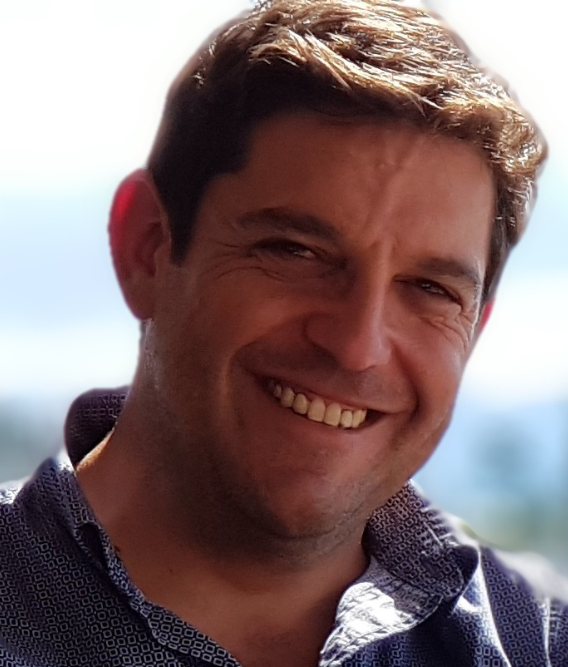
Food industry has been significantly advancing the last decades in terms of monitoring and surveillance as well food safety standards and regulations. Food security, reduction of waste and carbon food print has been significantly targeted as areas that need improvement. This puts a lot of pressure to business owners ensuring that investment perform to their financial expectations while at the same time they remain compliant to their applied regulations. To this we already know that even a perfect food safety plan and Environmental Monitoring programs although they may ensure consumer safety they pose a significant operation cost due to poor Hygienic Engineering Design standards.
A key success factor to mitigate this is by streamlining the communication and delivery of knowledge and information needed between business owners in the supply chain of infrastructure and asset development lifecycle., is key to ensure equipment and facility development are build fit for purpose.
Is this presentation we will be able to have a short look into the actual figures and practical quantifiable examples of how engineering specifications affect performance of operations.
The optimal selection of equipment needs to balance many factors, such as quality, performance, safety, cleanability, cost and sustainability.
In this presentation, Jim and Dimitri will share approaches taken by one of the largest food manufacturing companies in the world. This will cover topics such as processes, technical requirements, competencies and capabilities of those involved, as well as some of the challenges of managing this in a global manufacturing company. It will also cover how EHEDG guidelines are applied and the importance of collaboration between Original Equipment Manufacturers and end users in understanding and implementing user requirements.
Throughout my engineering career which count 23 years till today I have been fascinated with industrial engineering and novel developments. During this time I gain significant knowledge into the heavily regulated food industry, development standards and guidelines for processing equipment as well as facilities and incorporated integrated systems.
This led me to the position I hold today since 2020 as the Global Hygienic Design Excellence Leader, for Mondelez International. As the company's subject matter expert, my duties and responsibilities include the ensure capability building within the organization, development of internal standards and establish global policy standards. My areas of expertise are equipment development, civil works and infrastructure as well as electromechanical systems of buildings.
I have authored and advocated heavily on the business benefits and value of Hygienic Design as it is seen from business owners addressing total cost of ownership, cost avoidance as key factors of investment performance
In addition I have been heavily active and partnered with EHEDG participating into the development and revising of guidelines. In particular leading the development of "Hygienic maintenance guideline" which is overarching and complimenting almost every guideline EHEDG currently has released while addressing legacy systems instead of new developments
Debra Smith
Global Hygiene Specialist
Vikan
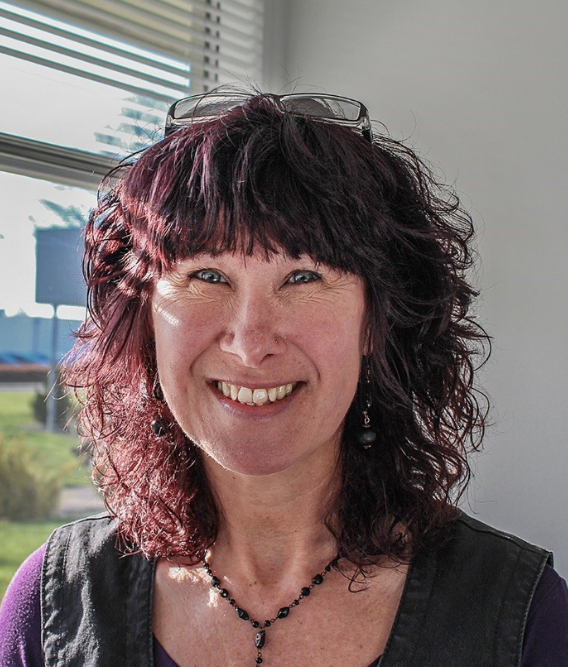
Deb thinks Hygienic Design should be considered as an essential pre-requisite for all equipment and facilities used in connection with food handling; it also extends to the safety of the materials used in contact with the food. It's surprising that many manufacturers, purchasers, and users of food industry equipment are unaware or overlook its importance. EHEDG and 3-A SSI have a long history in the promotion of hygienic design through the provision of training, guidance, certification, and expert advice. In the past, attention has primarily been directed towards the hygienic design of food processing equipment. However, there is now a growing recognition that ensuring food safety and quality also hinges on the hygienic design of the buildings where food processing occurs, the facilities supporting those structures, and the additional equipment utilised within the factory environment. As a consequence, EHEDG now publishes guidance on ‘Hygienic Design Principles for Food Factories’ (Guideline 44), and on ‘Air Quality Control for Building Ventilation’ (Guideline 47). Additionally, food industry cleaning tools and utensils have long been identified as a major source and vector of contamination 1,2,3, and the importance of their hygienic design is reflected in GFSI food safety standard requirements. This presentation will summarise existing and developing EHEDG guidance, and GFSI food safety standard requirements related to these supplementary sources of contamination within food production areas, and will investigate the future of hygienic design as a holistic concept within food production facilities.
Deb has 40 years of food safety/hygiene experience. Prior to joining Vikan she worked as a microbiologist at a large poultry production site; with DEFRA as a Scientific Officer in the Food Safety Division; and as Food Hygiene Research Manager at Campden BRI.
She holds qualifications in Applied Microbiology (HNC), Nutrition & Food Science (BSc (Hons)), Advanced Food Hygiene and HACCP. She is also holds the FSSC 22000 Lead Auditor qualification.
Deb regularly presents her research at national and international food safety events, and has authored/co-authored numerous food safety/hygiene publications, including peer reviewed papers, book chapters, and several food industry hygiene guidelines.
She is active with numerous food safety-related scientific and technical groups including being,
-
Co-chair of the EHEDG UK & Ireland Regional Section, and a member of the EHEDG Advisory Board;
-
A member of International Association for Food Protection, and the UKAFP Affiliate Committee (Treasurer). Last year she was the recipient of the IAFP Sanitarian award;
-
a Fellow of the IFST, and sitting on their Scientific Committee; and
-
a Director for the Society for Food Hygiene and Technology.
As Global Hygiene Specialist at Vikan, Deb provides food safety and hygiene advice, training, and support to both colleagues and customers.
Christian Geubert
Product Leader Sealing Materials
Angst+Pfister

As of December 2023, global discussions on the regulation of poly- and perfluorinated alkylated substances (PFAS) have gained prominence, with a particular focus on their impact on sealing technology in the food and beverage industry. The presentation will shed light on the current status of regulatory considerations, specifically those planned for implementation in the European Union. The proposed regulations encompass various polymeric materials, including PTFE, FKM, FFKM, and FEP, all integral to sealing technology. Despite the existence of secure manufacturing processes and proper waste treatment methods, there is a looming possibility of these materials being banned. Notably, these materials comply with food and pharmaceutical regulations globally, demonstrating their safety through positive lists and extraction tests during application. While some regions, such as the United States and the United Kingdom, have excluded polymers from similar regulations based on the OECD definition, the European Union is currently engaged in ongoing discussions among stakeholders. The presentation will delve into the challenges associated with these discussions and highlight the desirability of aligning with the OECD definition to mitigate potential bans. It will also present fluorine-free replacements and examine restrictions and consequences that may arise in the event of a complete ban, as proposed.
Christian Geubert works for the Angst+Pfister Group, now a leading developer and manufacturer of technical components and engineering solutions with a company history of over one hundred years.
As Product Leader Sealing Materials, he is one of the board’s task force core member for projects around the drafted PFAS regulations, apart from other material related tasks and intensive committee work at German standards committee DIN, German Machine Manufacturers’ Association VDMA and others.
He has been a member of EHEDG since 2008, serving on the board of Regional Section Germany for the past nine years, and lectures on food technology at Cooperative State University Baden-Wuerttemberg (DHBW).
After studying chemical engineering and doing his thesis at the Max-Planck-Institute for Polymer Research, Christian worked 16 years for Freudenberg Sealing Technology in various roles covering material development, product management and international business development within Europe, US, Brazil and China.
Barış Güleş
General Manager
BGA Mühendislik ve İnşaat Ltd. Şti.
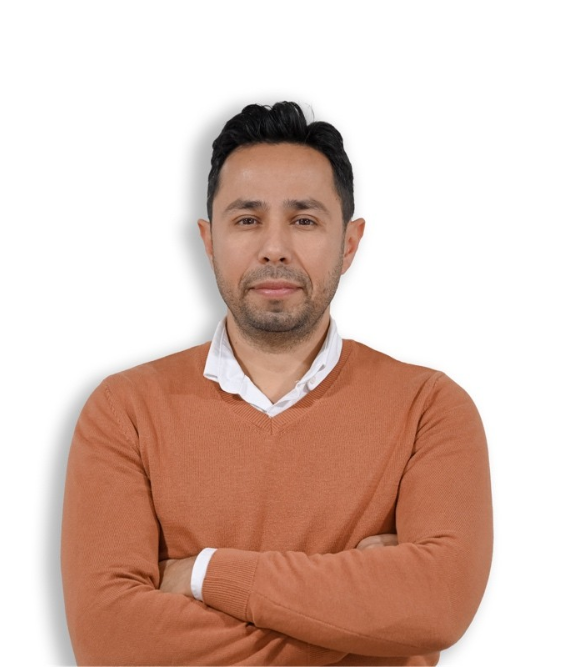
Turkiye joined EHEDG in 2012. Commencing in mid-2014, Hygienic Design Training and face-to-face hygienic design introduction visits began at the company level by Onur Devres. In 2015, the first three members joined EHEDG from Turkiye.
As stated under GFSI 2020 JI and JII topics, food processing facilities' construction and food processing equipment should be designed and engineered according to hygienic design principles. However, explaining all this to companies and ensuring they understand, accept, and internalize it (and become members and pay the EHEDG membership fees) takes time. Primarily since 2016, visits and briefings have been conducted every year for current, global, and potential members. Consequently, the number of members increased, and existing members continued to stay within EHEDG.
At the end of 2021, Sadef decided to establish a freeze-dryer facility in Aydin. For the design of the facility, Onur Devres and Ugur Uzuner, who had previously received hygienic design training from him, started discussions with architects, constructors, installation engineers, building element manufacturers, refrigeration companies, fruit processing machinery manufacturers, and freeze dryer equipment manufacturers. Positive discrimination was particularly applied to EHEDG members in the selection of subcontractor companies. After creating the preliminary construction project, work began on the placement of devices, installations, and drainage. To eliminate the problems encountered during this period and to ensure better project realization, non-member subcontractor companies were encouraged to join EHEDG and the architects, engineers, and designers from Sadef and subcontractor companies involved in the project attended the EHEDG Advanced Course on Hygienic Engineering and Design.
As of 2024, the construction of the 23,000 m2 Sadef company facility has been completed; the number of members has approached 40; and nearly 40 global member companies have participated in EHEDG activities in Turkiye.
The Sadef project has actually been an example of constantly addressing the importance of hygienic design and engineering in a country and observing its development over time on a unique company basis. We believe that this will set a new state in benchmarking for other companies.
Barış Güleş was born in 1985 in Afyon. He graduated from the Civil Engineering Department at Eskişehir Osmangazi University in 2010. Between 2010 and 2015, he gained extensive experience working for various engineering firms on industrial facility construction projects, including food processing. From 2015 to 2020, he served as Project Manager at Vercon Project and Management Tic. Ltd. Şti. During this time, he was involved in the establishment of chocolate, bakery, tobacco, and brewery processing facilities.
In 2020 he founded BGA Mühendislik ve İnşaat Ltd. Şti. The company consists of competent engineers and architects capable of preparing and undertaking electrical, mechanical, structural, and architectural application projects. One of the most important projects undertaken in this context is the establishment of the Sadef Gıda Facility.
BGA is an EHEDG member, and Güleş has successfully completed the EHEDG Advanced Course on Hygienic Design. Preparations have begun on the BGA basis related to the GFSI 2020 JI Hygienic Design of Food Buildings and Processing Equipment (for building constructors and equipment manufacturers) scope.
Aurélie Hanin
Head of the Microbiology, Hygiene and Processes Department
ACTALIA
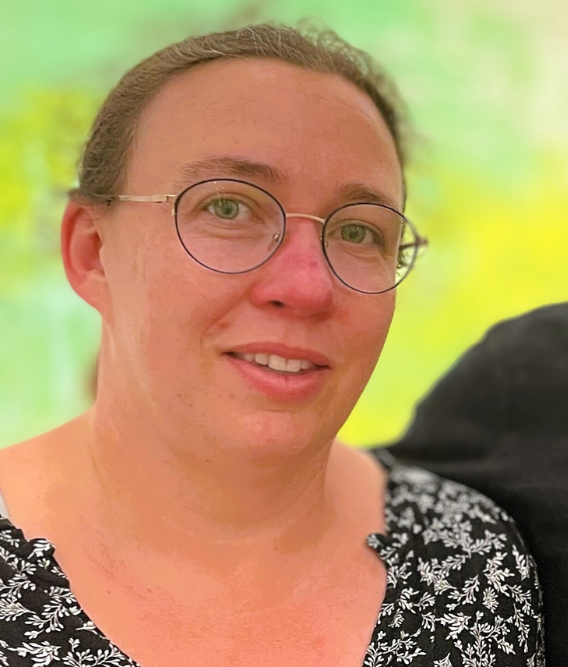
Soil adhesion to food processing environment surfaces, including floors, is unwanted as it may result in increased cleaning costs and act as a reservoir for undesirable pathogenic microorganisms. In France, a list of agreed floors for use in food production facilities is edited based on their slipperiness and their cleanability. This parameter is currently assessed by microscopic observation and enumeration of the surface imperfections (holes, cracks and aggregates)(Carpentier, B. 2011). This method is highly dependent on the evaluator experience and lacks of reproducibility. Therefore, a new standard method would be appreciated. The protocol described in the recently published EHEDG Doc.57 for the assessment of open process equipment cleanability was then tested and optimized for use on floors. This approach was also compared to a more conventional microbiological method. All three tested protocols allowed to differentiate floors samples as a function of their cleanability but results were inconsistent for a majority of samples as a function of the implemented test. This highlights the need for further research on floors hygiene in order to develop a new reliable standard method to assess the cleanability assessment test dedicated to floors.
Aurélie joined ACTALIA's Food Safety unit in 2013 after a thesis and post-doctoral experience in microbiology. Based in Normandy, in Saint-Lô, she initially worked on the behavior of pathogenic bacteria and their impact on food shelf life. However, she soon turned her attention to the formation of biofilms, their resistance to disinfectants and the cross-contamination of food via the processing environment. She then became head of the "Microbiology, Hygiene and Food Processing" department, also considering the hygienic design of manufacturing equipment and facilities to reduce the occurrence of cross-contaminations.
Her career spans extensive participation in national research programs monitoring the presence of Listeria monocytogenes in food processing environments and emphasizing the role of the application of disinfectants on the ability of this pathogen to persist for extended periods in facilities. More recently, her team has participated in the EHEDG ‘Robotics’ working group and has been involved in the development of an open plant and open process equipment cleaning (OPC) test method. In addition to the in-place cleanability of equipments, ACTALIA has then become one of the three test laboratories able to implement the new OPC method.
Anthony Chemaly
CEO
IBL Africa
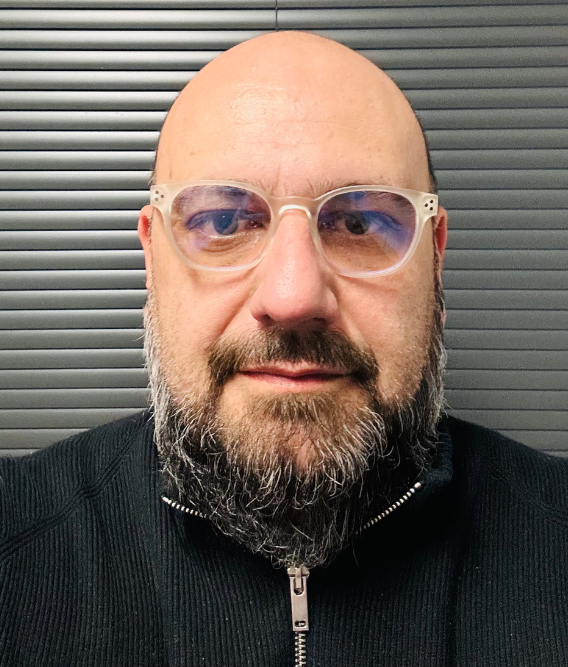
The presentation explores the potential of AI-driven chatbots, like OpenAI’s ChatGPT, to enhance food safety in resource-limited settings, particularly in second and third-world countries where expert knowledge and training are scarce. It highlights how these AI tools can assist less experienced food safety professionals in small to medium food production factories by simplifying complex guidelines into more understandable formats, making critical safety information accessible in multiple languages, and providing immediate translations. This capability is especially beneficial in factories with diverse linguistic and cultural backgrounds, ensuring clearer comprehension and implementation of safety protocols.
Furthermore, the presentation demonstrates how chatbots can generate code that integrates with presentation software, aiding the creation of customized training manuals. The future potential of OpenAI’s tools, including text-to-video and text-to-voice technologies, is discussed as a way to revolutionize training processes, transforming intricate standards into user-friendly training videos and voiceovers. This innovation could educate even illiterate maintenance staff effectively.
Anthony Chemaly is a seasoned professional in the field of food safety and quality assurance, bringing over 30 years of extensive experience. As the CEO of IBL Africa, he has successfully led the company to become a premier provider of niche Food Safety Management System Auditing and technical support services for major retailers in Africa and Europe. Anthony’s expertise spans across various industries, including retail, hospitality, and food manufacturing with 24 year’s experience as a food safety auditor.
Anthony has been involved in the writing and implementation of retailer food safety standards, social compliance standards and several quality assurance innovations for clients in the retail food space. An experienced trainer with a special focus on Allergen management, food fraud, hygienic engineering in the prevention of Listeria management and the use of technology in the food safety space.
Andy Timperley
Chair of the EHEDG Sub-Committee Certification
Timperley Consulting
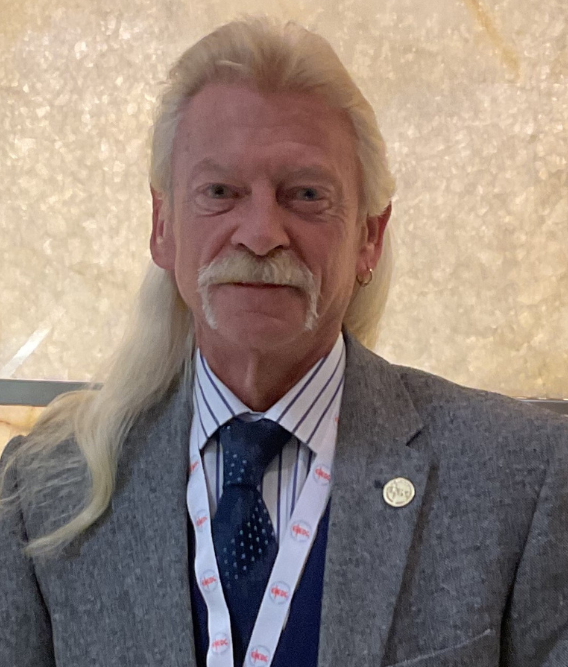
EHEDG has developed and published a new test method for assessing the cleanability of food processing equipment intended to be used in open processing and wet spray cleaned without dismantling. This test will now reinforce the Certification Scheme and provide a practical approach for certifying equipment used in open processing applications. The test follows the basic principles of EHEDG Guideline 2 method and consists of soiling the piece of equipment to be tested, followed by a mild cleaning procedure and a final assessment. A reference piece is used to monitor correct implementation of the cleaning procedure to differentiate between good and poor design features.
The reproducibility and repeatability of the test is achieved using an industrial robot to conduct the cleaning procedure in a controlled way using sophisticated 2D mapping software. The degree of cleanliness is based on the removal of a soil containing a UV tracer and is assessed by evaluating the residual soil using a UV light. The test is intended as a basic screening test for identifying areas of poor hygienic design in equipment used in open processes and is not indicative of performance in industrial cleaning situations. You can download (or purchase) EHEDG Guideline 57, ‘A Method for the Assessment of Open Process Equipment Cleanability’ here.
Andy Timperley is a Hygienic Design Engineer, working as a Consultant to the Food Industry. He has over forty years’ experience in engineering related disciplines since joining a Fluid Power Research Association in 1980 and subsequently Campden BRI in 1988. Since leaving Campden BRI in 2006 his main activities include;
-
Providing consultancy on equipment selection and system design issues.
-
Conducting hygienic design audits of food factories and troubleshooting.
-
Conducting third party inspections of equipment and issuing Certification documentation in conjunction with the European Hygienic Engineering and Design Group (EHEDG) Certification Scheme.
-
Conducting third party verification (TPV) inspections of equipment on behalf of 3-A Sanitary Standards Inc. to support the application of 3-A and P3-A symbols.
-
Conducting basic and advanced hygienic design training courses in conjunction with EHEDG and for specific Companies.
-
Providing material for guideline documents on hygienic design of equipment and food factories.
-
Producing Hygienic Design Guidelines and Test Methods in conjunction with the EHEDG.
Andy also provides hygienic design consultancy to the European Standards Organisation (CEN) as the named UK Hygiene Expert responsible for hygienic design issues relating to plenary and machine specific 'C' Standards which are then published in the UK by the British Standards Institute. In February 2004, Andy became the first European based Certified Conformance Evaluator (CCE) for 3-A Sanitary Standards Inc. In June 2006 Andy was elected Chairman of the EHEDG Test Methods Sub-group and continues to be the Chairman of the re-named EHEDG Sub Committee Certification. In January 2009, Andy qualified as a CCE for the P3-A group of Standards for pharmaceutical equipment. Andy was appointed as an EHEDG authorised trainer in July 2009 and continues to provide EHEDG Basic and Advanced Courses on Hygienic Engineering.
Anett Winkler
Food Safety Advisor / EMEA Microbiologist
Cargill

In the food and beverage manufacturing industry, water serves various purposes, impacting product safety, production reliability and workplace safety. With water scarcity on the rise, there's a growing emphasis on water reuse, posing new challenges to ensure reused water meets quality standards. Water treatment is essential to elevate reused water quality, a common practice in most food factories. Challenges also arise in storing and distributing water, necessitating controlled processes to maintain quality. Occupational health risks, particularly from Legionella spp. proliferation, are critical considerations. Legionella can lead to severe diseases like Legionellosis or Legionnaires’ disease. The upcoming presentation will cover these aspects, offering guidance on hygienic water management practices, including sourcing, storage, and distribution. It will also highlight different water categories used in the food industry and provide insights into controlling Legionella in water systems.
Anett Winkler joined Kraft Jacobs Suchard in December 1998 to head up the research microbiology laboratory in Munich. Later on Anett concentrated on chocolate, biscuits and other low moisture foods including supplier developments and approvals. She also consolidated the scientific basis for microbiological process controls in low moisture foods by performing validation studies for nut & cocoa processing. Following a regional role for Microbiology in the Eastern European, Middle East & African Region, she was globally designing food safety programmes, rolling out training modules related to food safety and further supporting supplier development. Anett was also the global expert for thermal processing within Mondelez International.
In October 2017 Anett moved to a new position as “EMEA Food Safety Advisor” at Cargill, where she is supporting all Cargill businesses in that region (Europe/Middle East/Africa) for microbiological and food safety-related topics. Anett is active within EHEDG (Chair of Working Group Water Management), ILSI Europe (Chair of Microbiology Food Safety TF), and is a member of ICMSF. Within Germany she is also co-editor of the Handbook on Food Hygiene.
Ana Dymond Soares
Food Safety Specialist
JDE Peet's
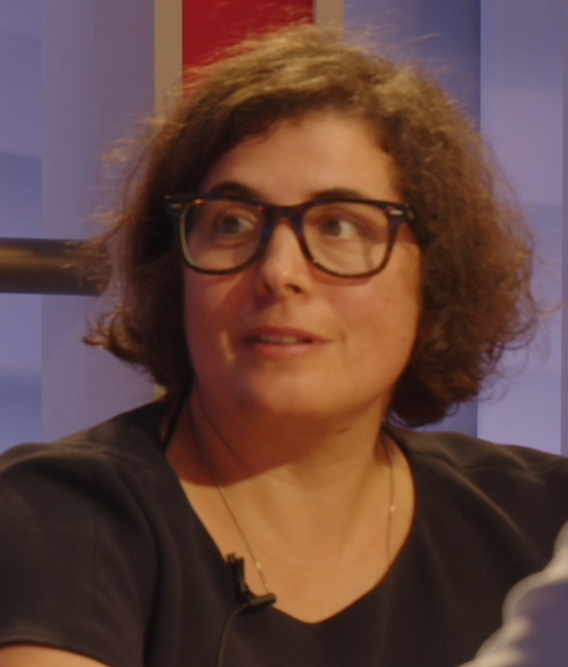
JDE Peet’s has been expanding through the acquisition of various coffee and tea companies, which introduces unique challenges and risks that must be effectively managed. In her talk, Ana will discuss the strategies employed by JDE Peet’s to integrate an acquired factory into JDE Peet’s quality and food safety standards.
Ana’s presentation will cover:
- The methods used to identify and assess hygienic design risks, along with a review of risk mitigation practices.
- The prioritization of investments to address higher or more difficult-to-mitigate risks.
- The integration of HACCP (Hazard Analysis Critical Control Point) equipment risk management.
This approach highlights a business opportunity for managing food safety risks through a risk-based approach to equipment renewal.
Ana Dymond Soares is a Food Safety Expert with over 23 years of experience in the food industry. Graduating with a Food Engineering degree from Universidade Catolica Portuguesa in 2000, and after an initial period in Process Development Ana has dedicated her career to ensuring high food safety and quality standards.
Starting at Kraft Foods, Ana specialized in thermal processing validation, where she strengthened her food safety knowledge. In 2012 following the split of Kraft Foods, Ana became Global Thermal Processing Associate Principal Scientist, where she played a crucial role in setting the requirements for the validation of the suppliers in particular retort and UHT and aseptic, further expanding her expertise in hygienic design.
Currently, Ana is the Global Food Safety Excellence Expert at Jacobs Douwe Egberts Peet’s where she designs food safety programmes, training modules and supporting the development of JDEP’s factories and suppliers.
An active member of EHEDG since 2012, Ana has contributed to the heat treatment working group drafting guidance documents and she also chaired the aseptic committee of the Institute of Thermal Processing Specialists from 2016- 2019.
Alain Le Bail
Professor
ONIRIS

As of December 2023, global discussions on the regulation of poly- and perfluorinated alkylated substances (PFAS) have gained prominence, with a particular focus on their impact on sealing technology in the food and beverage industry. The presentation will shed light on the current status of regulatory considerations, specifically those planned for implementation in the European Union. The proposed regulations encompass various polymeric materials, including PTFE, FKM, FFKM, and FEP, all integral to sealing technology. Despite the existence of secure manufacturing processes and proper waste treatment methods, there is a looming possibility of these materials being banned. Notably, these materials comply with food and pharmaceutical regulations globally, demonstrating their safety through positive lists and extraction tests during application. While some regions, such as the United States and the United Kingdom, have excluded polymers from similar regulations based on the OECD definition, the European Union is currently engaged in ongoing discussions among stakeholders. The presentation will delve into the challenges associated with these discussions and highlight the desirability of aligning with the OECD definition to mitigate potential bans. It will also present fluorine-free replacements and examine restrictions and consequences that may arise in the event of a complete ban, as proposed.
Dr. Alain Le Bail obtained his PhD in Heat Transfer and Fluid Dynamics from the University of Nantes (France) in 1990. Currently a Professor at ONIRIS, the Nantes-Atlantic National College of Food Science and Engineering and Veterinary, Dr. Le Bail is a leading expert in materials science and engineering, focusing on how processing affects food structure and functionality.
Within the MAPS group of UMR GEPEA, his research encompasses baking technology, cereal sciences, and food freezing. With over 30 supervised PhD students and about 200 peer-reviewed papers and book chapters, he has made significant contributions to the field. Dr. Le Bail has also co-authored 9 patents, demonstrating his innovative impact.
His leadership extends beyond research; he served as President of the International Association of Engineering and Food (IAEF) and currently leads the commission C2 on food engineering at the International Institute of Refrigeration. Additionally, he contributes to prestigious journals like FOODS and Food Chemistry Advances. Throughout his career, Dr. Le Bail remains dedicated to advancing food science and engineering through research, education, and collaboration.
Adwy van den Berg
Operations Director
EHEDG
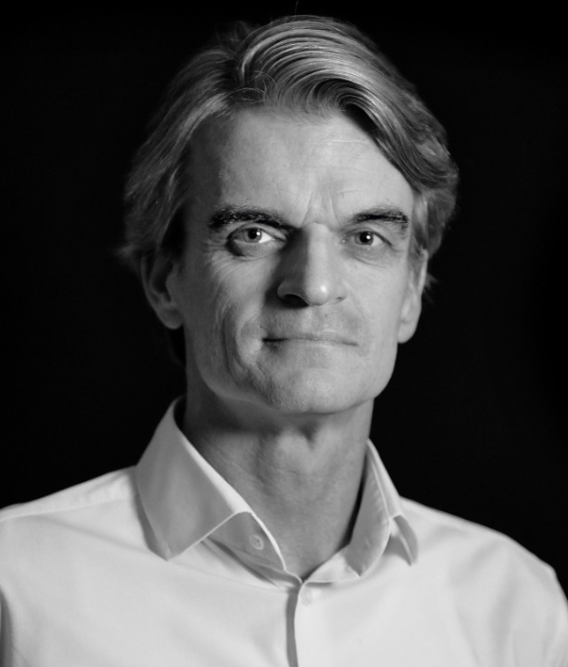
In November 2023, Young EFFoST (European Federation of Food Science and Technology) in cooperation with EHEDG kick-started the EYE Mentorship Programme during the EFFoST Conference in Valencia. This programme pairs young professionals with experts from the fields of food science and technology. In the programme, mentees and mentors meet regularly and work together on several topics according to their needs and preferences. In this, the focus lies on personal development as well as professional growth. Intertwined with the 1:1 meetings, on-site events are taking place to enhance networking and to provide hands-on workshops for all participants. In this talk, Felix Schottroff and Adwy van den Berg will present the highlights of the first round of the EYE Mentorship Programme and will announce the start of the 2nd round of the programme.
Adwy van den Berg has served as the Director of EHEDG since the foundation relocated from Frankfurt to Amsterdam in 2021. With a creative mind and extensive experience in marketing, Adwy brings a passion for business and a commitment to people in all his activities.
Adwy has held various international marketing and sales leadership positions, developing commercial strategies, creating innovative products, and managing key account teams. His energetic and motivational leadership has inspired teams to achieve ambitious goals.
Under Adwy’s leadership, EHEDG has seen solid growth in memberships and initiatives. The organisation now offers over 50 guidelines on hygienic design, covering topics from general principles to equipment for dry and liquid food. EHEDG is known for its high-quality courses and rigorous testing and certification methods, ensuring companies meet stringent food safety standards.
In collaboration with EFFoST, EHEDG introduced the EYE Mentorship Programme, offering young professionals the opportunity to learn from experienced industry leaders. This initiative exemplifies Adwy's dedication to fostering the next generation of talent in the food industry.
Adam Ruskin
Product Leader Food Safety & Technical Support
Ecolab
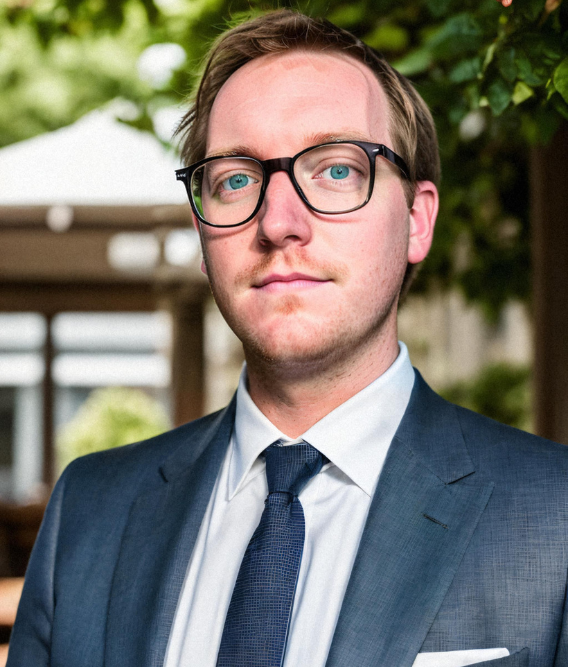
Effective cleaning and disinfection linked with hygienic design in food factories are pivotal for enhancing productivity, sustainability, and food safety. With focus on hygienic design, factories can deliver many improvements by reducing water usage, conserving chemicals, improving utility consumption, and preventing microbiological contamination. These practices offer significant savings and operational efficiencies. You might ask yourself how is this possible?
Adam will talk about how a strong focus on hygienic design in OPC (Open Plant Cleaning) and in CIP (Cleaning in Place) applications can have a positive impact on costs, but also on employee satisfaction, all while driving environmental sustainability.
Adam Ruskin is the Technical Excellence Manager for Food Safety and Food and Protein at Ecolab Europe. He holds a Chemical Engineering degree from Clarkson University, NY, USA. Throughout his career, Adam has held various roles in Quality, Food Safety, Process Engineering, and Laboratory Management. His extensive experience has often involved leveraging hygienic design to enhance cost efficiency, reduce microbiological issues, and improve sustainability in food factories. Currently, Adam focuses on food hygiene aspects related to food safety and supporting the EU food and protein Technical Excellence team. His mission is to aid Ecolab’s customers in achieving superior hygiene solutions and addressing food safety challenges, demonstrating how quality and safety are integral to operational success.
